
speechlib
speechlib is a library that can do speaker diarization, transcription and speaker recognition on an audio file to create transcripts with actual speaker names
Stars: 123
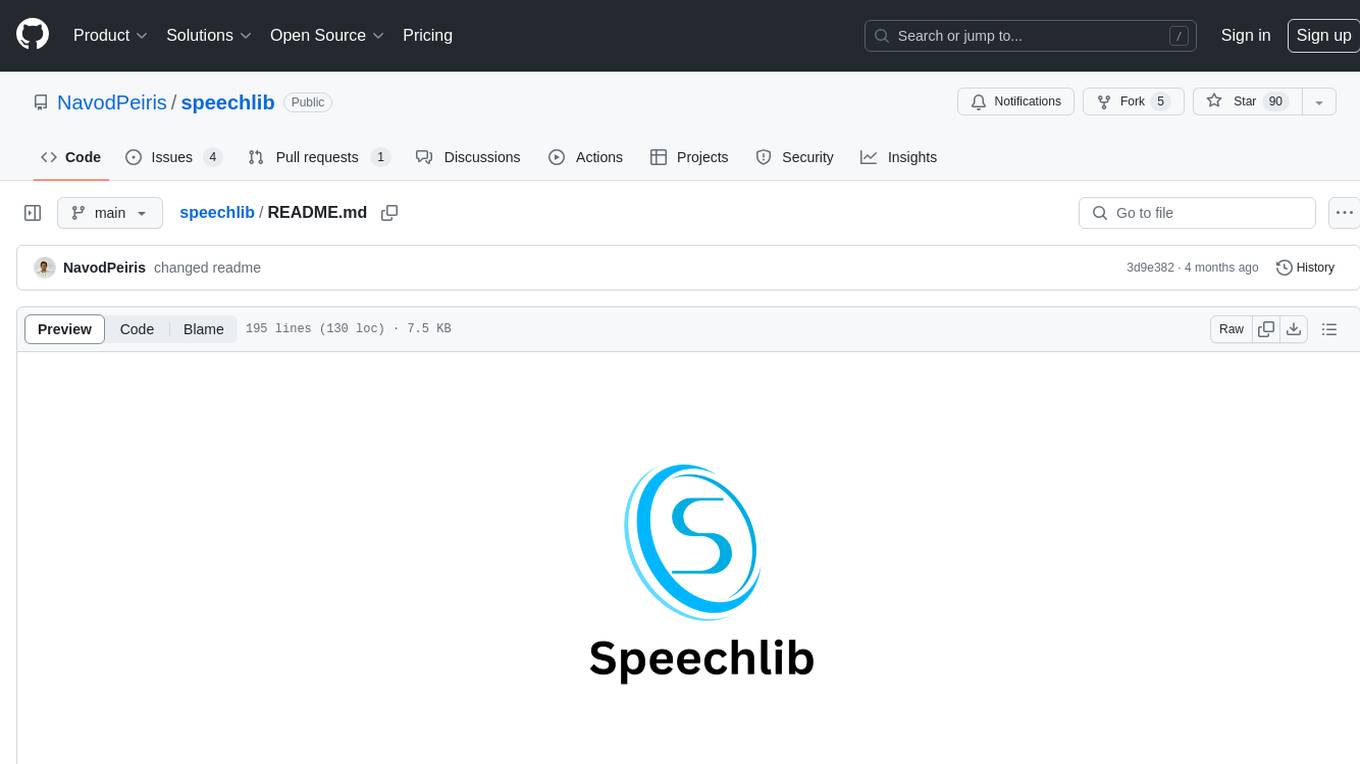
Speechlib is a Python library that provides functionalities for speaker diarization, speaker recognition, and transcription on audio files. It offers features such as converting audio formats to WAV, converting stereo to mono, and re-encoding to 16-bit PCM. The library allows users to transcribe audio files, store transcripts, specify language and model size, and perform speaker recognition using voice samples. It supports various languages and provides performance metrics for different model sizes. Speechlib utilizes huggingface models for speaker recognition and transcription tasks.
README:
you will get following error if administrator permission is not there:
OSError: [WinError 1314] A required privilege is not held by the client
- Python 3.8 or greater
GPU execution needs CUDA 11.
GPU execution requires the following NVIDIA libraries to be installed:
There are multiple ways to install these libraries. The recommended way is described in the official NVIDIA documentation, but we also suggest other installation methods below.
on google colab run this to install CUDA dependencies:
!apt install libcublas11
You can see this example notebook
pip install speechlib
This library does speaker diarization, speaker recognition, and transcription on a single wav file to provide a transcript with actual speaker names. This library will also return an array containing result information. ⚙
This library contains following audio preprocessing functions:
-
convert other audio formats to wav
-
convert stereo wav file to mono
-
re-encode the wav file to have 16-bit PCM encoding
Transcriptor method takes 7 arguments.
-
file to transcribe
-
log_folder to store transcription
-
language used for transcribing (language code is used)
-
model size ("tiny", "small", "medium", "large", "large-v1", "large-v2", "large-v3")
-
ACCESS_TOKEN: huggingface acccess token (also get permission to access
pyannote/[email protected]) -
voices_folder (contains speaker voice samples for speaker recognition)
-
quantization: this determine whether to use int8 quantization or not. Quantization may speed up the process but lower the accuracy.
voices_folder should contain subfolders named with speaker names. Each subfolder belongs to a speaker and it can contain many voice samples. This will be used for speaker recognition to identify the speaker.
if voices_folder is not provided then speaker tags will be arbitrary.
log_folder is to store the final transcript as a text file.
transcript will also indicate the timeframe in seconds where each speaker speaks.
file = "obama_zach.wav" # your audio file
voices_folder = "" # voices folder containing voice samples for recognition
language = "en" # language code
log_folder = "logs" # log folder for storing transcripts
modelSize = "tiny" # size of model to be used [tiny, small, medium, large-v1, large-v2, large-v3]
quantization = False # setting this 'True' may speed up the process but lower the accuracy
ACCESS_TOKEN = "your hf key" # get permission to access pyannote/[email protected] on huggingface
# quantization only works on faster-whisper
transcriptor = Transcriptor(file, log_folder, language, modelSize, ACCESS_TOKEN, voices_folder, quantization)
# use normal whisper
res = transcriptor.whisper()
# use faster-whisper (simply faster)
res = transcriptor.faster_whisper()
# use a custom trained whisper model
res = transcriptor.custom_whisper("D:/whisper_tiny_model/tiny.pt")
# use a huggingface whisper model
res = transcriptor.huggingface_model("Jingmiao/whisper-small-chinese_base")
# use assembly ai model
res = transcriptor.assemby_ai_model("your api key")
res --> [["start", "end", "text", "speaker"], ["start", "end", "text", "speaker"]...]
start: starting time of speech in seconds
end: ending time of speech in seconds
text: transcribed text for speech during start and end
speaker: speaker of the text
supported language codes:
"af", "am", "ar", "as", "az", "ba", "be", "bg", "bn", "bo", "br", "bs", "ca", "cs", "cy", "da", "de", "el", "en", "es", "et", "eu", "fa", "fi", "fo", "fr", "gl", "gu", "ha", "haw", "he", "hi", "hr", "ht", "hu", "hy", "id", "is","it", "ja", "jw", "ka", "kk", "km", "kn", "ko", "la", "lb", "ln", "lo", "lt", "lv", "mg", "mi", "mk", "ml", "mn","mr", "ms", "mt", "my", "ne", "nl", "nn", "no", "oc", "pa", "pl", "ps", "pt", "ro", "ru", "sa", "sd", "si", "sk","sl", "sn", "so", "sq", "sr", "su", "sv", "sw", "ta", "te", "tg", "th", "tk", "tl", "tr", "tt", "uk", "ur", "uz","vi", "yi", "yo", "zh", "yue"
supported language names:
"Afrikaans", "Amharic", "Arabic", "Assamese", "Azerbaijani", "Bashkir", "Belarusian", "Bulgarian", "Bengali","Tibetan", "Breton", "Bosnian", "Catalan", "Czech", "Welsh", "Danish", "German", "Greek", "English", "Spanish","Estonian", "Basque", "Persian", "Finnish", "Faroese", "French", "Galician", "Gujarati", "Hausa", "Hawaiian","Hebrew", "Hindi", "Croatian", "Haitian", "Hungarian", "Armenian", "Indonesian", "Icelandic", "Italian", "Japanese","Javanese", "Georgian", "Kazakh", "Khmer", "Kannada", "Korean", "Latin", "Luxembourgish", "Lingala", "Lao","Lithuanian", "Latvian", "Malagasy", "Maori", "Macedonian", "Malayalam", "Mongolian", "Marathi", "Malay", "Maltese","Burmese", "Nepali", "Dutch", "Norwegian Nynorsk", "Norwegian", "Occitan", "Punjabi", "Polish", "Pashto","Portuguese", "Romanian", "Russian", "Sanskrit", "Sindhi", "Sinhalese", "Slovak", "Slovenian", "Shona", "Somali","Albanian", "Serbian", "Sundanese", "Swedish", "Swahili", "Tamil", "Telugu", "Tajik", "Thai", "Turkmen", "Tagalog","Turkish", "Tatar", "Ukrainian", "Urdu", "Uzbek", "Vietnamese", "Yiddish", "Yoruba", "Chinese", "Cantonese",
from speechlib import PreProcessor
file = "obama1.mp3"
#initialize
prep = PreProcessor()
# convert mp3 to wav
wav_file = prep.convert_to_wav(file)
# convert wav file from stereo to mono
prep.convert_to_mono(wav_file)
# re-encode wav file to have 16-bit PCM encoding
prep.re_encode(wav_file)
These metrics are from Google Colab tests.
These metrics do not take into account model download times.
These metrics are done without quantization enabled.
(quantization will make this even faster)
metrics for faster-whisper "tiny" model:
on gpu:
audio name: obama_zach.wav
duration: 6 min 36 s
diarization time: 24s
speaker recognition time: 10s
transcription time: 64s
metrics for faster-whisper "small" model:
on gpu:
audio name: obama_zach.wav
duration: 6 min 36 s
diarization time: 24s
speaker recognition time: 10s
transcription time: 95s
metrics for faster-whisper "medium" model:
on gpu:
audio name: obama_zach.wav
duration: 6 min 36 s
diarization time: 24s
speaker recognition time: 10s
transcription time: 193s
metrics for faster-whisper "large" model:
on gpu:
audio name: obama_zach.wav
duration: 6 min 36 s
diarization time: 24s
speaker recognition time: 10s
transcription time: 343s
because older versions give more accurate transcriptions. this was tested.
This library uses following huggingface models:
For Tasks:
Click tags to check more tools for each tasksFor Jobs:
Alternative AI tools for speechlib
Similar Open Source Tools

speechlib
Speechlib is a Python library that provides functionalities for speaker diarization, speaker recognition, and transcription on audio files. It offers features such as converting audio formats to WAV, converting stereo to mono, and re-encoding to 16-bit PCM. The library allows users to transcribe audio files, store transcripts, specify language and model size, and perform speaker recognition using voice samples. It supports various languages and provides performance metrics for different model sizes. Speechlib utilizes huggingface models for speaker recognition and transcription tasks.
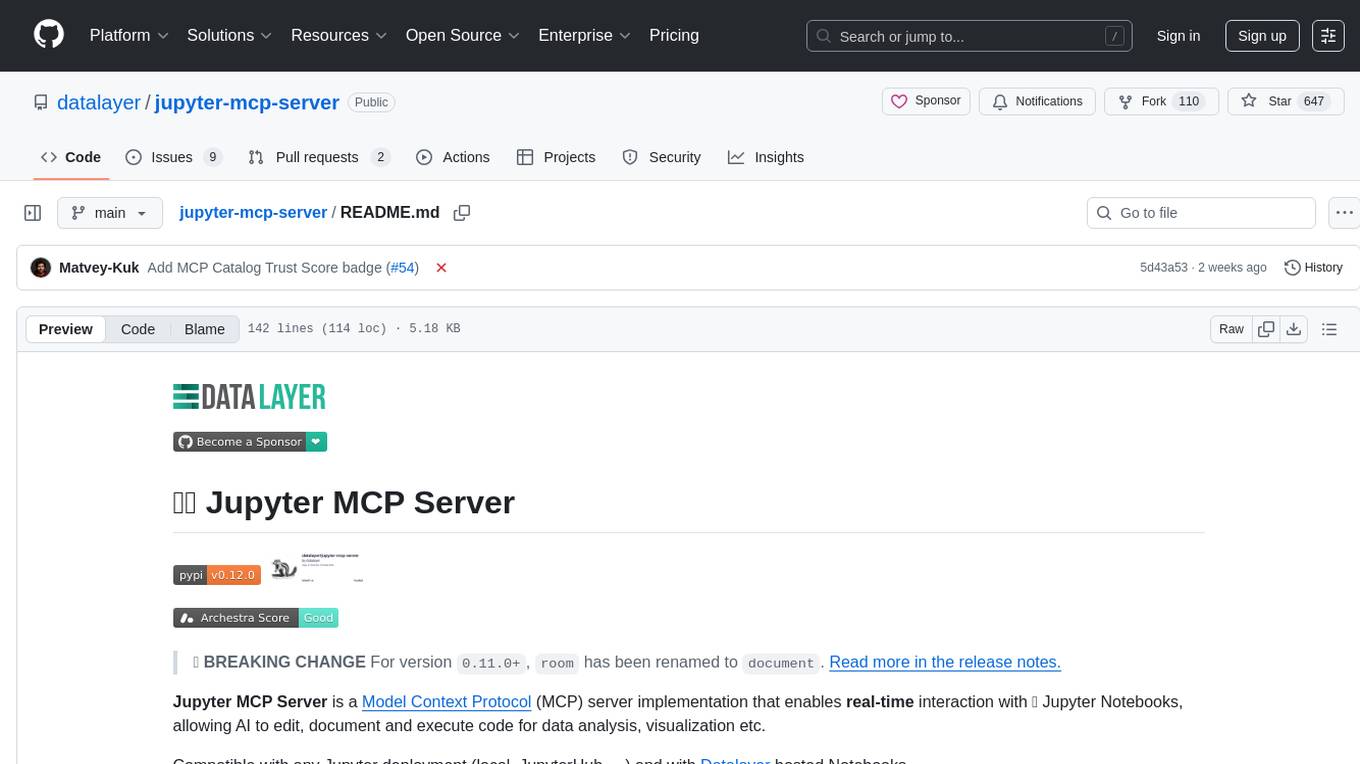
jupyter-mcp-server
Jupyter MCP Server is a Model Context Protocol (MCP) server implementation that enables real-time interaction with Jupyter Notebooks. It allows AI to edit, document, and execute code for data analysis and visualization. The server offers features like real-time control, smart execution, and MCP compatibility. Users can use tools such as insert_execute_code_cell, append_markdown_cell, get_notebook_info, and read_cell for advanced interactions with Jupyter notebooks.
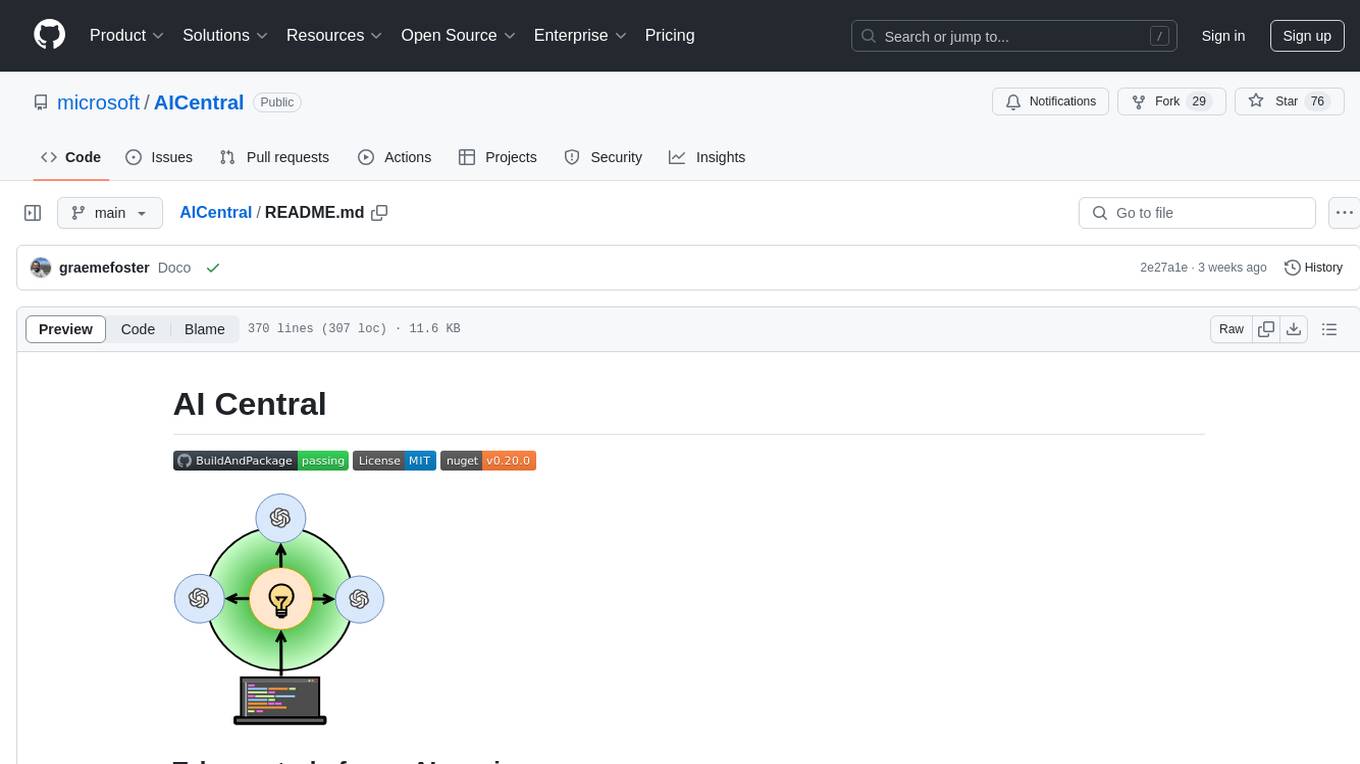
AICentral
AI Central is a powerful tool designed to take control of your AI services with minimal overhead. It is built on Asp.Net Core and dotnet 8, offering fast web-server performance. The tool enables advanced Azure APIm scenarios, PII stripping logging to Cosmos DB, token metrics through Open Telemetry, and intelligent routing features. AI Central supports various endpoint selection strategies, proxying asynchronous requests, custom OAuth2 authorization, circuit breakers, rate limiting, and extensibility through plugins. It provides an extensibility model for easy plugin development and offers enriched telemetry and logging capabilities for monitoring and insights.
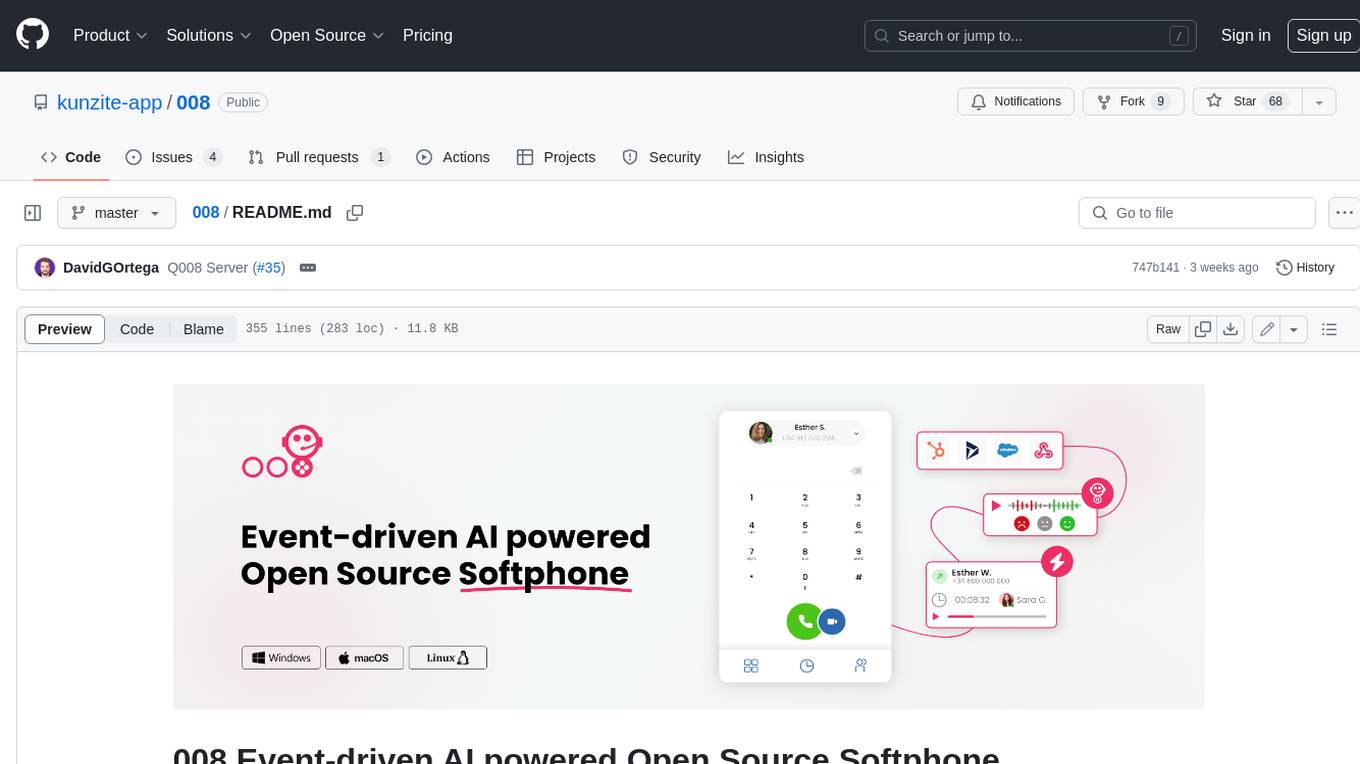
008
008 is an open-source event-driven AI powered WebRTC Softphone compatible with macOS, Windows, and Linux. It is also accessible on the web. The name '008' or 'agent 008' reflects our ambition: beyond crafting the premier Open Source Softphone, we aim to introduce a programmable, event-driven AI agent. This agent utilizes embedded artificial intelligence models operating directly on the softphone, ensuring efficiency and reduced operational costs.

firecrawl
Firecrawl is an API service that takes a URL, crawls it, and converts it into clean markdown. It crawls all accessible subpages and provides clean markdown for each, without requiring a sitemap. The API is easy to use and can be self-hosted. It also integrates with Langchain and Llama Index. The Python SDK makes it easy to crawl and scrape websites in Python code.
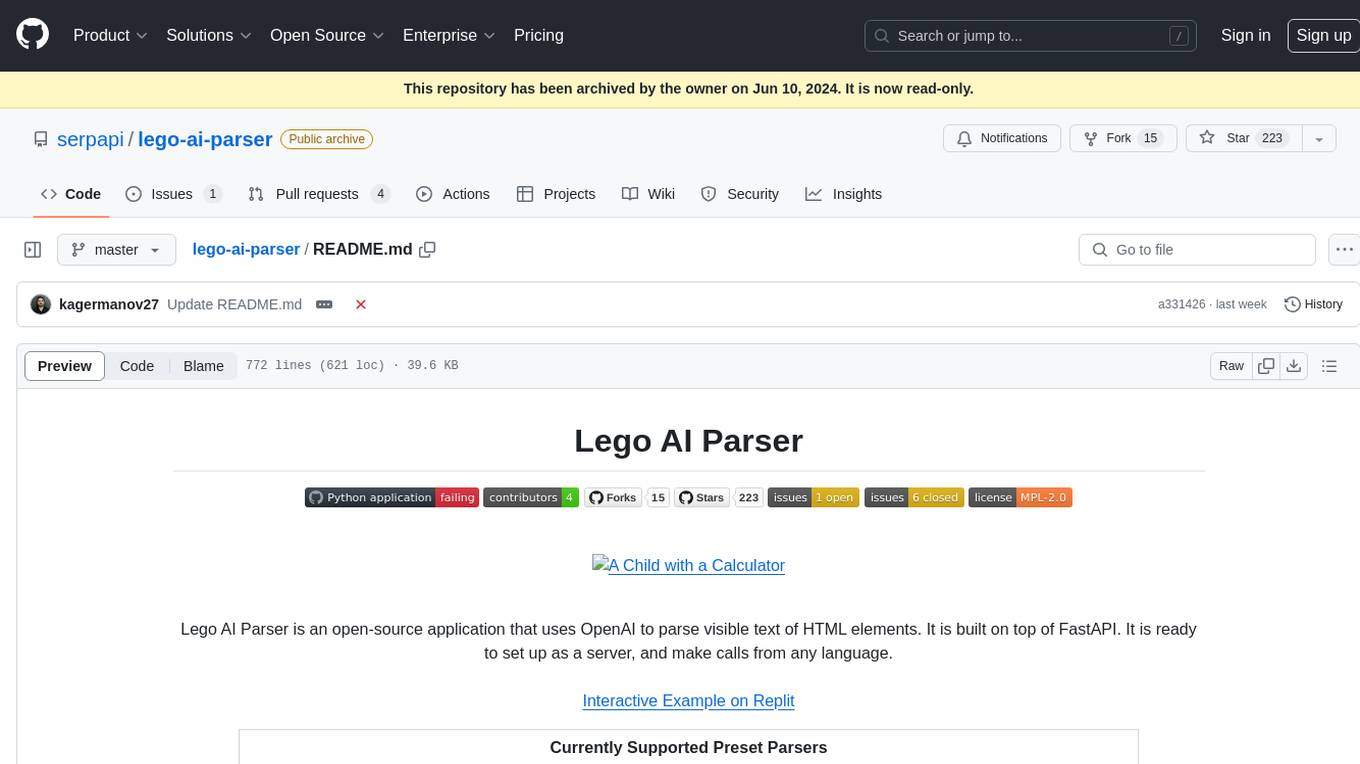
lego-ai-parser
Lego AI Parser is an open-source application that uses OpenAI to parse visible text of HTML elements. It is built on top of FastAPI, ready to set up as a server, and make calls from any language. It supports preset parsers for Google Local Results, Amazon Listings, Etsy Listings, Wayfair Listings, BestBuy Listings, Costco Listings, Macy's Listings, and Nordstrom Listings. Users can also design custom parsers by providing prompts, examples, and details about the OpenAI model under the classifier key.
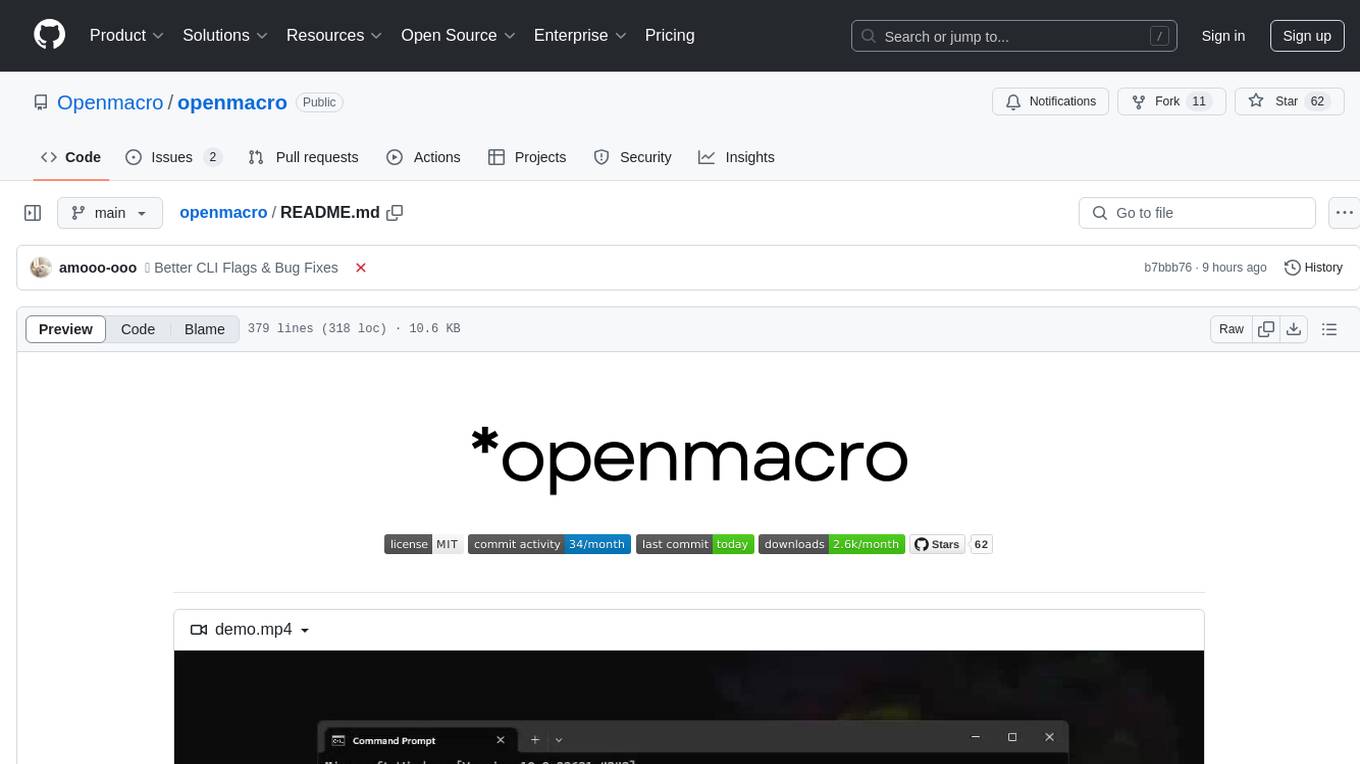
openmacro
Openmacro is a multimodal personal agent that allows users to run code locally. It acts as a personal agent capable of completing and automating tasks autonomously via self-prompting. The tool provides a CLI natural-language interface for completing and automating tasks, analyzing and plotting data, browsing the web, and manipulating files. Currently, it supports API keys for models powered by SambaNova, with plans to add support for other hosts like OpenAI and Anthropic in future versions.
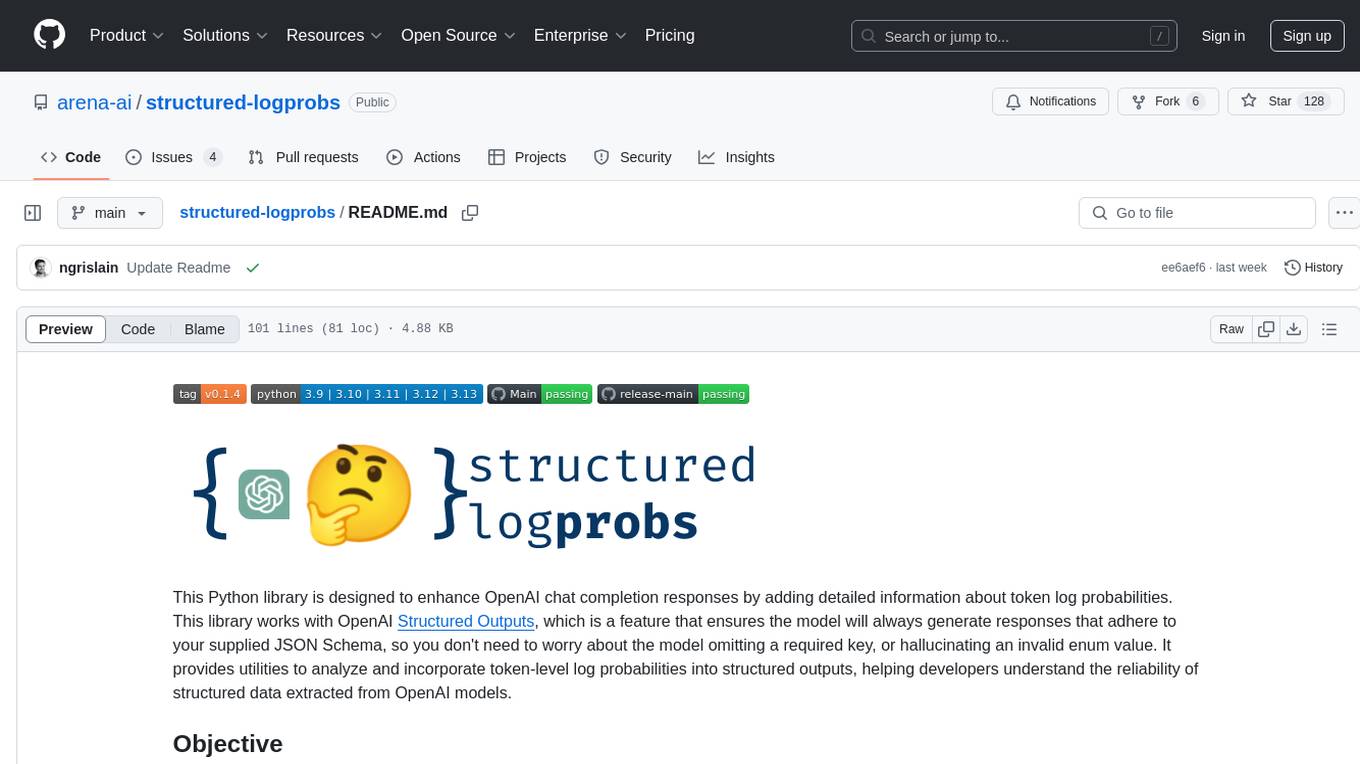
structured-logprobs
This Python library enhances OpenAI chat completion responses by providing detailed information about token log probabilities. It works with OpenAI Structured Outputs to ensure model-generated responses adhere to a JSON Schema. Developers can analyze and incorporate token-level log probabilities to understand the reliability of structured data extracted from OpenAI models.
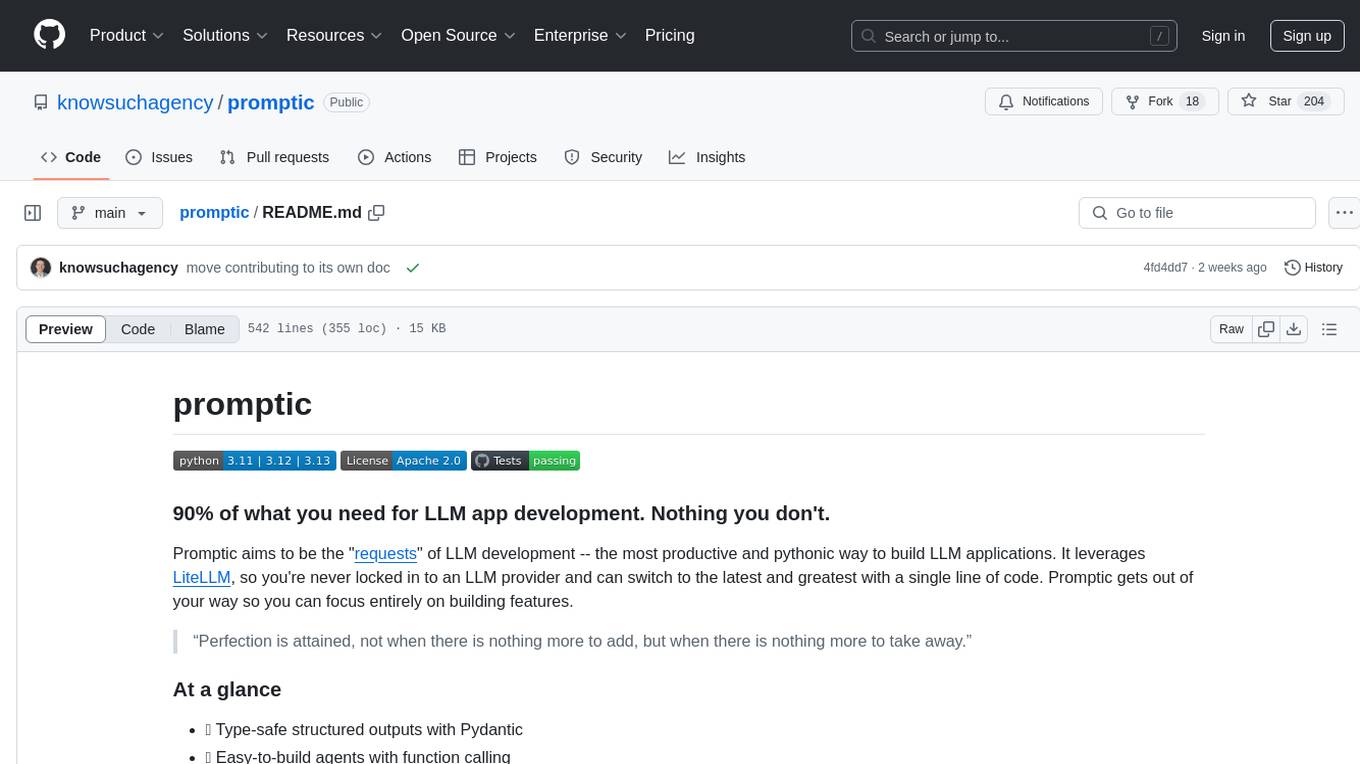
promptic
Promptic is a tool designed for LLM app development, providing a productive and pythonic way to build LLM applications. It leverages LiteLLM, allowing flexibility to switch LLM providers easily. Promptic focuses on building features by providing type-safe structured outputs, easy-to-build agents, streaming support, automatic prompt caching, and built-in conversation memory.
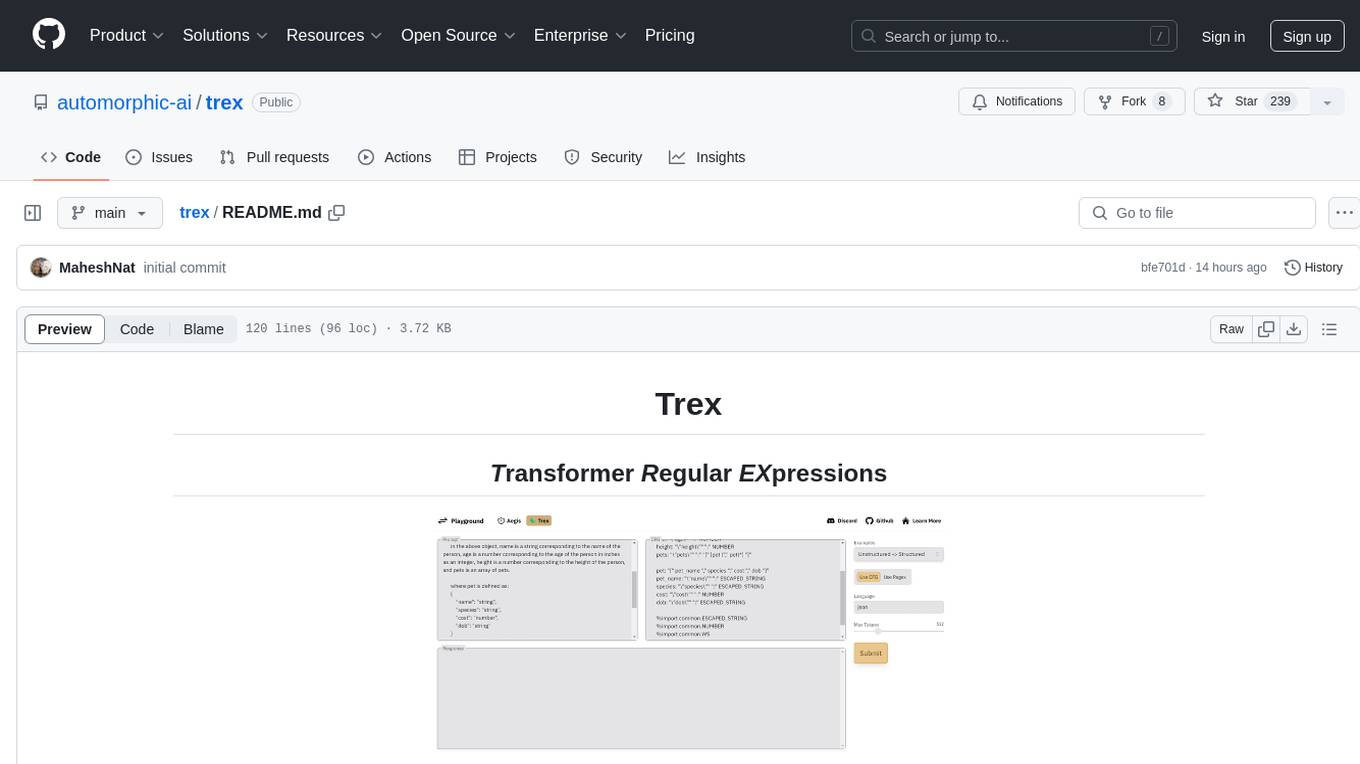
trex
Trex is a tool that transforms unstructured data into structured data by specifying a regex or context-free grammar. It intelligently restructures data to conform to the defined schema. It offers a Python client for installation and requires an API key obtained by signing up at automorphic.ai. The tool supports generating structured JSON objects based on user-defined schemas and prompts. Trex aims to provide significant speed improvements, structured custom CFG and regex generation, and generation from JSON schema. Future plans include auto-prompt generation for unstructured ETL and more intelligent models.
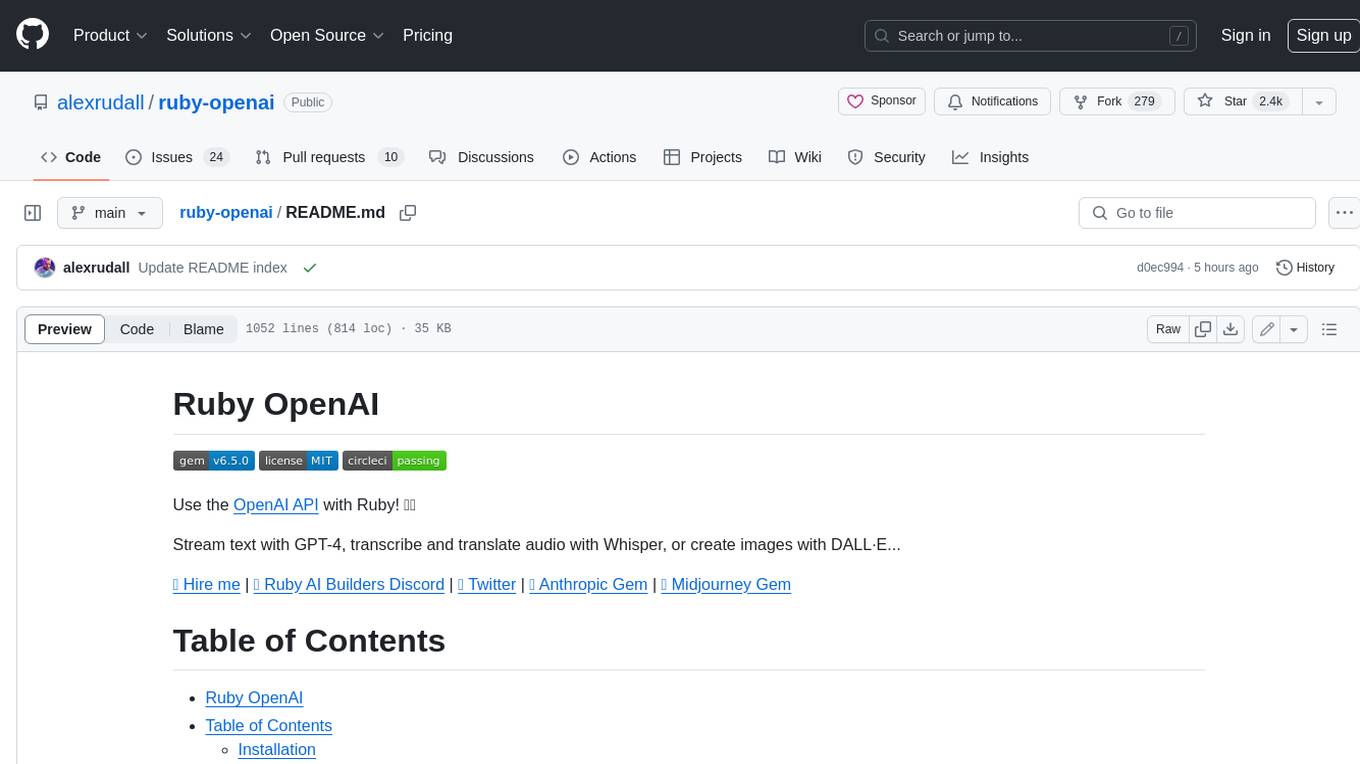
ruby-openai
Use the OpenAI API with Ruby! 🤖🩵 Stream text with GPT-4, transcribe and translate audio with Whisper, or create images with DALL·E... Hire me | 🎮 Ruby AI Builders Discord | 🐦 Twitter | 🧠 Anthropic Gem | 🚂 Midjourney Gem ## Table of Contents * Ruby OpenAI * Table of Contents * Installation * Bundler * Gem install * Usage * Quickstart * With Config * Custom timeout or base URI * Extra Headers per Client * Logging * Errors * Faraday middleware * Azure * Ollama * Counting Tokens * Models * Examples * Chat * Streaming Chat * Vision * JSON Mode * Functions * Edits * Embeddings * Batches * Files * Finetunes * Assistants * Threads and Messages * Runs * Runs involving function tools * Image Generation * DALL·E 2 * DALL·E 3 * Image Edit * Image Variations * Moderations * Whisper * Translate * Transcribe * Speech * Errors * Development * Release * Contributing * License * Code of Conduct
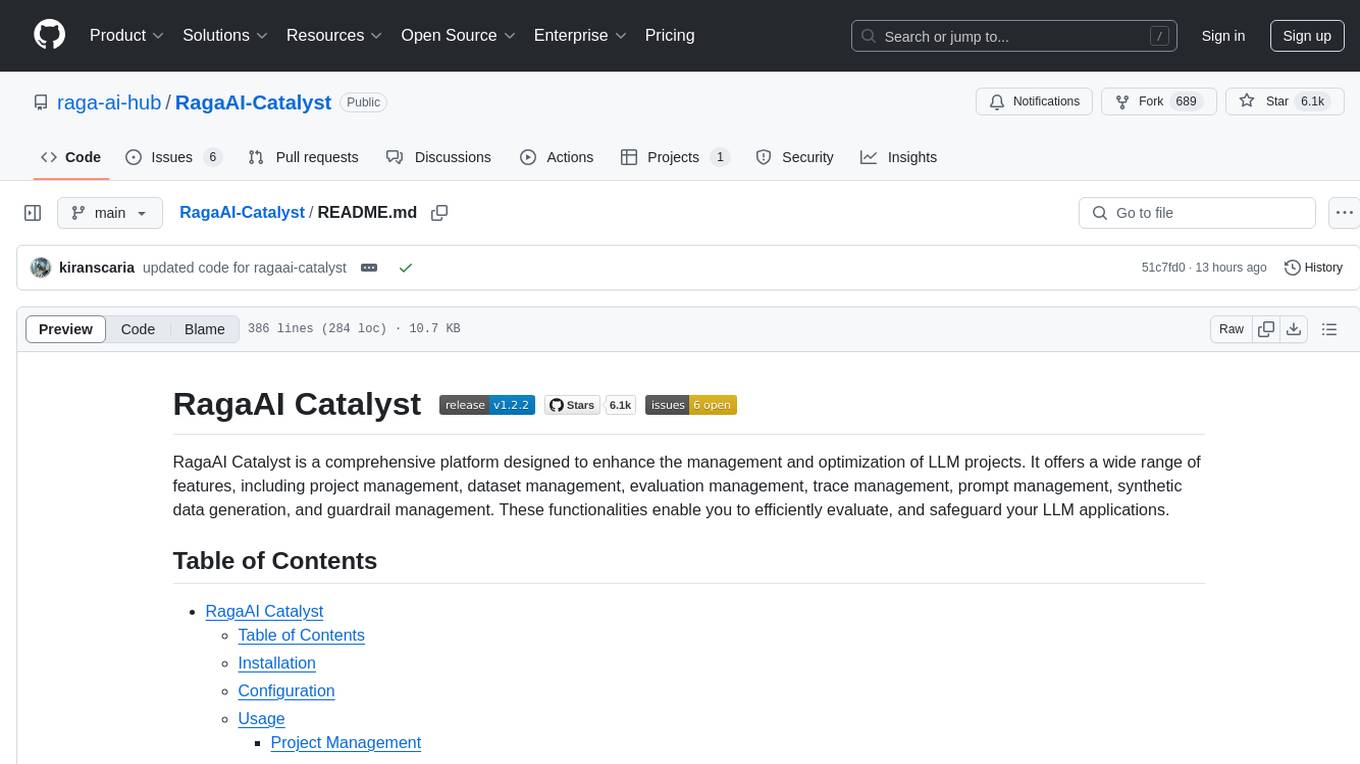
RagaAI-Catalyst
RagaAI Catalyst is a comprehensive platform designed to enhance the management and optimization of LLM projects. It offers features such as project management, dataset management, evaluation management, trace management, prompt management, synthetic data generation, and guardrail management. These functionalities enable efficient evaluation and safeguarding of LLM applications.
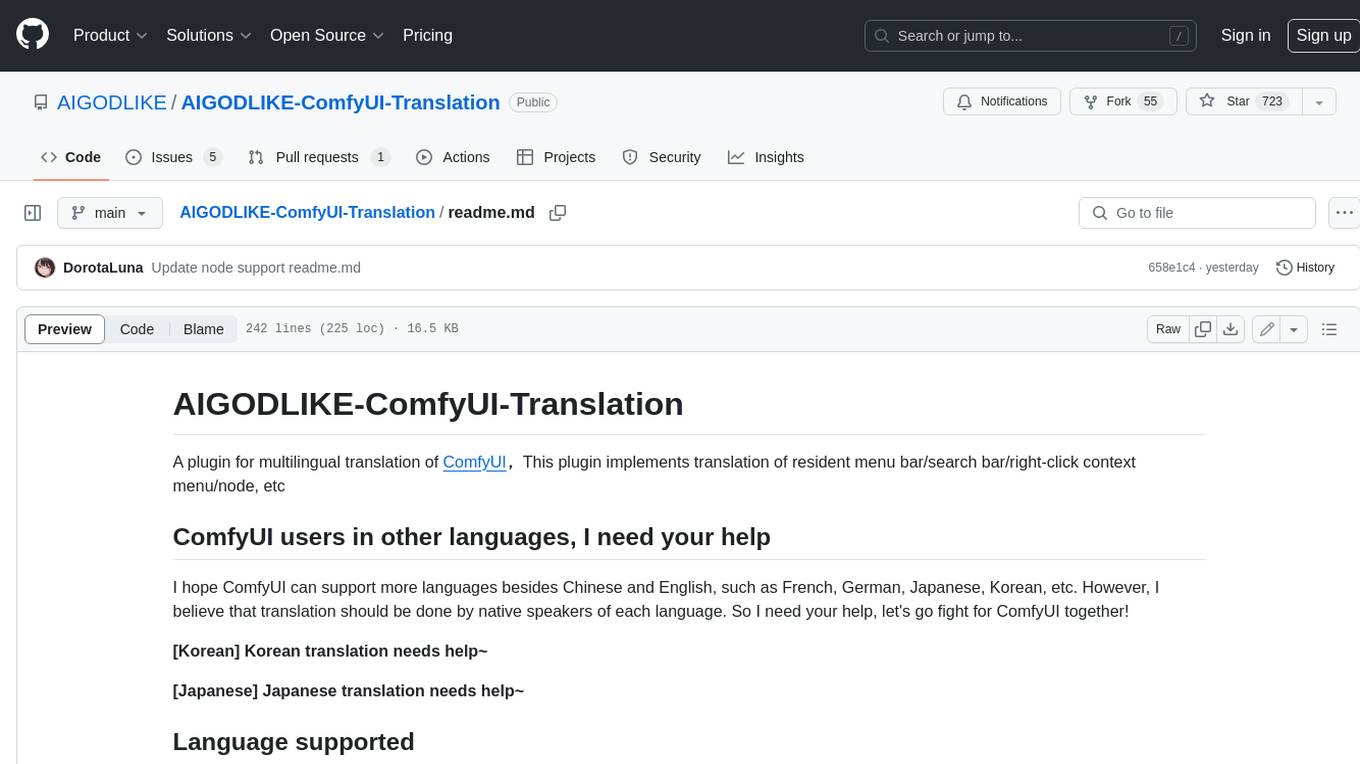
AIGODLIKE-ComfyUI-Translation
A plugin for multilingual translation of ComfyUI, This plugin implements translation of resident menu bar/search bar/right-click context menu/node, etc
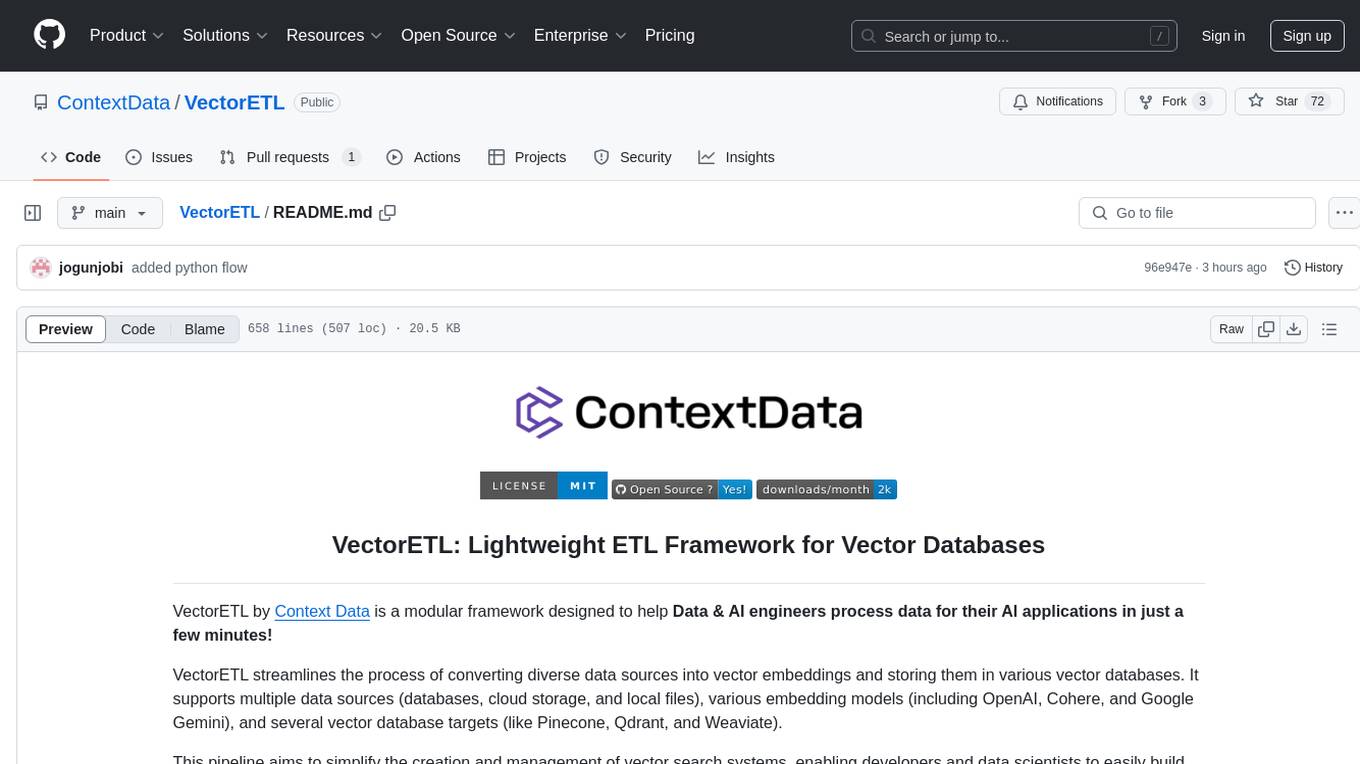
VectorETL
VectorETL is a lightweight ETL framework designed to assist Data & AI engineers in processing data for AI applications quickly. It streamlines the conversion of diverse data sources into vector embeddings and storage in various vector databases. The framework supports multiple data sources, embedding models, and vector database targets, simplifying the creation and management of vector search systems for semantic search, recommendation systems, and other vector-based operations.
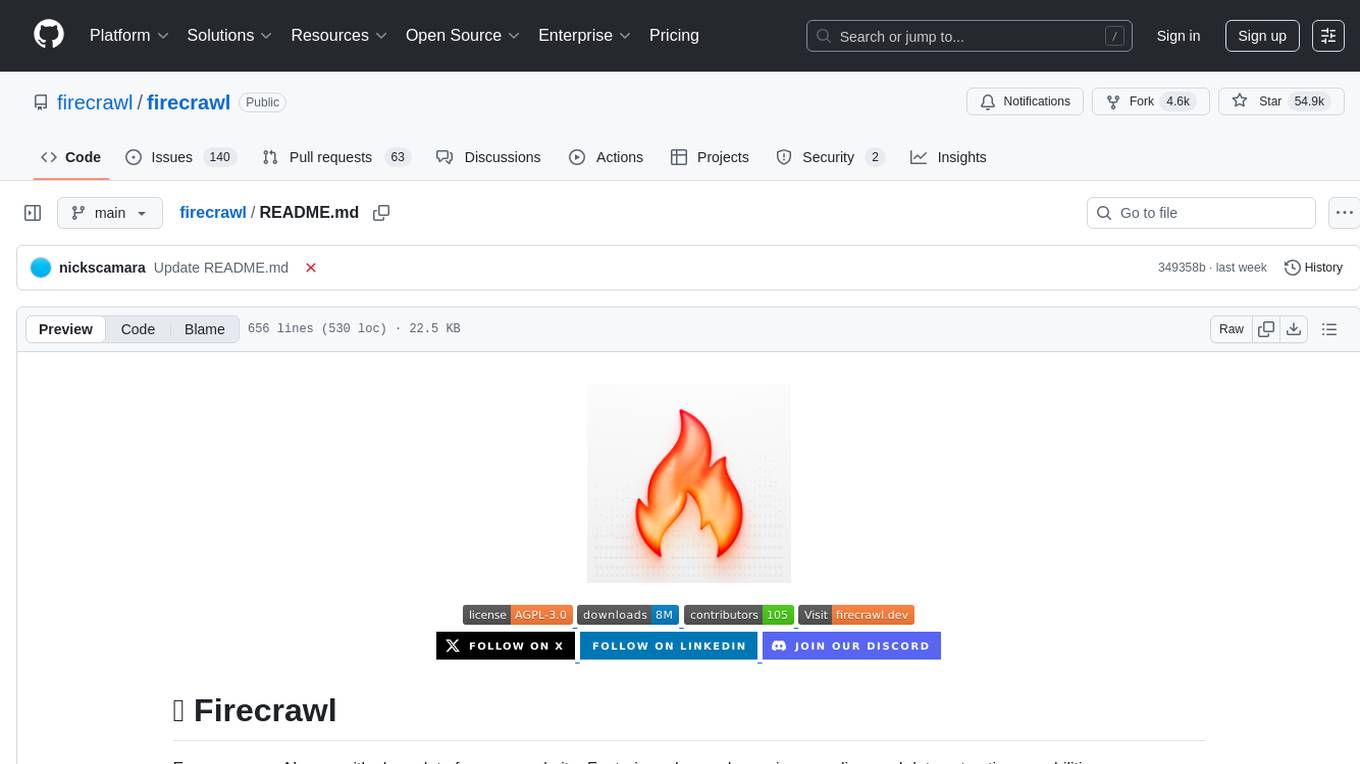
firecrawl
Firecrawl is an API service that empowers AI applications with clean data from any website. It features advanced scraping, crawling, and data extraction capabilities. The repository is still in development, integrating custom modules into the mono repo. Users can run it locally but it's not fully ready for self-hosted deployment yet. Firecrawl offers powerful capabilities like scraping, crawling, mapping, searching, and extracting structured data from single pages, multiple pages, or entire websites with AI. It supports various formats, actions, and batch scraping. The tool is designed to handle proxies, anti-bot mechanisms, dynamic content, media parsing, change tracking, and more. Firecrawl is available as an open-source project under the AGPL-3.0 license, with additional features offered in the cloud version.
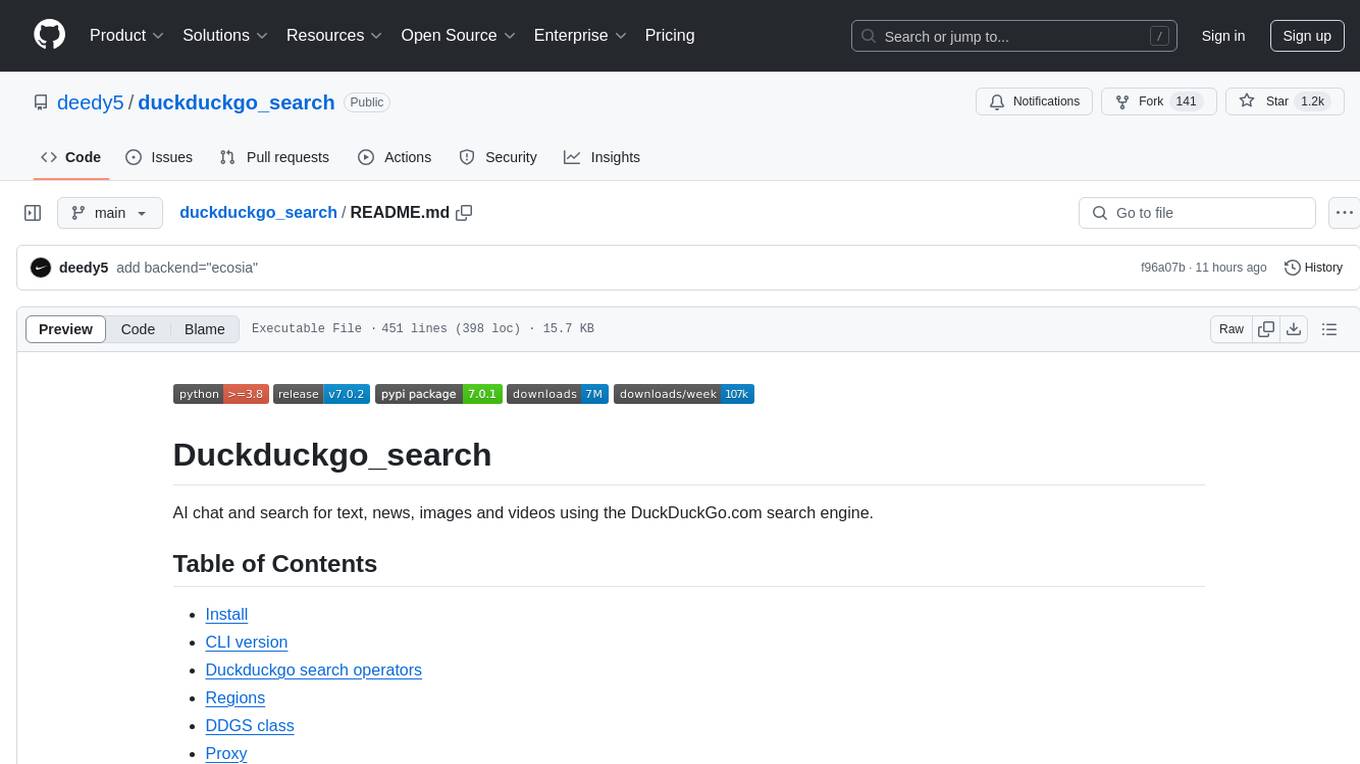
duckduckgo_search
Duckduckgo_search is a Python library that enables AI chat and search functionalities for text, news, images, and videos using the DuckDuckGo.com search engine. It provides various methods for different search types such as text, images, videos, and news. The library also supports search operators, regions, proxy settings, and exception handling. Users can interact with the DuckDuckGo API to retrieve search results based on specific queries and parameters.
For similar tasks

speechlib
Speechlib is a Python library that provides functionalities for speaker diarization, speaker recognition, and transcription on audio files. It offers features such as converting audio formats to WAV, converting stereo to mono, and re-encoding to 16-bit PCM. The library allows users to transcribe audio files, store transcripts, specify language and model size, and perform speaker recognition using voice samples. It supports various languages and provides performance metrics for different model sizes. Speechlib utilizes huggingface models for speaker recognition and transcription tasks.
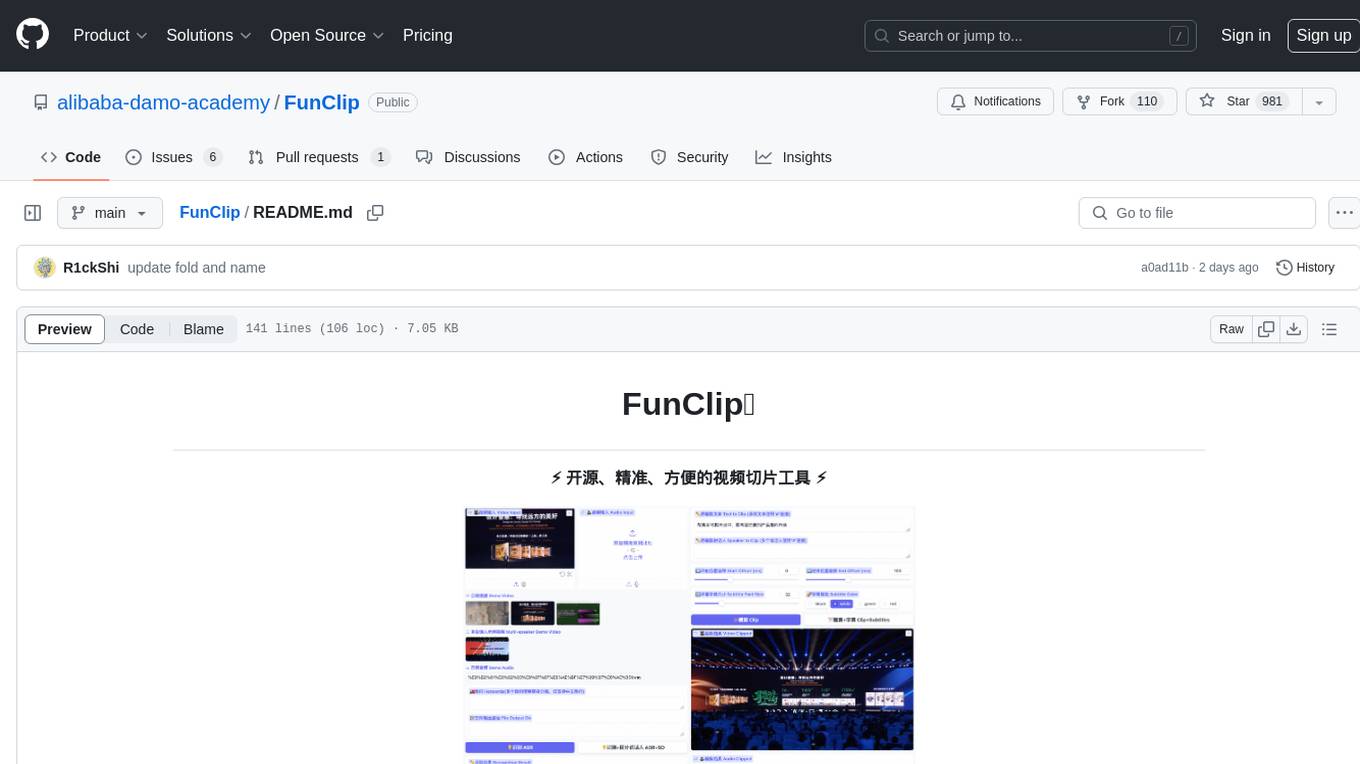
FunClip
FunClip is an open-source, locally deployable automated video editing tool that utilizes the FunASR Paraformer series models from Alibaba DAMO Academy for speech recognition in videos. Users can select text segments or speakers from the recognition results and click the clip button to obtain the corresponding video segments. FunClip integrates advanced features such as the Paraformer-Large model for accurate Chinese ASR, SeACo-Paraformer for customized hotword recognition, CAM++ speaker recognition model, Gradio interactive interface for easy usage, support for multiple free edits with automatic SRT subtitles generation, and segment-specific SRT subtitles.
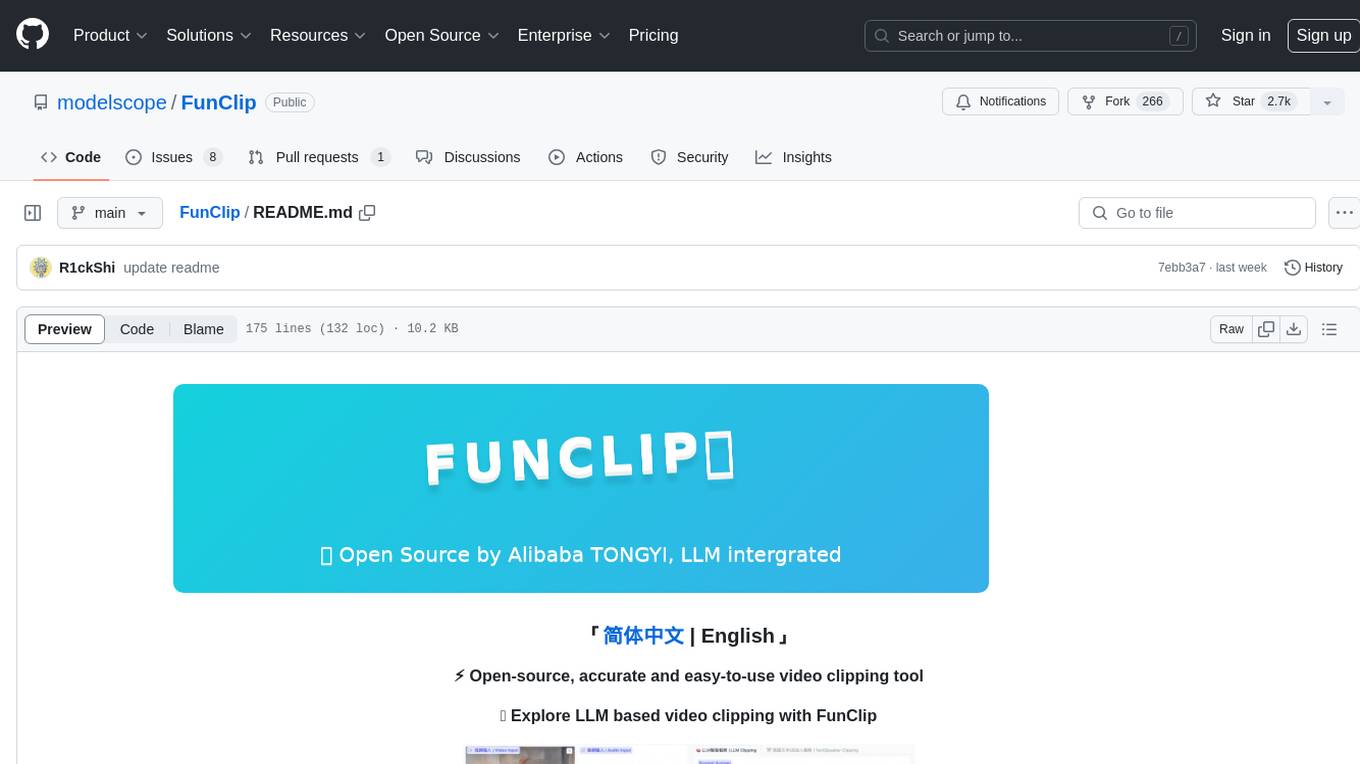
FunClip
FunClip is an open-source, locally deployed automated video clipping tool that leverages Alibaba TONGYI speech lab's FunASR Paraformer series models for speech recognition on videos. Users can select text segments or speakers from recognition results to obtain corresponding video clips. It integrates industrial-grade models for accurate predictions and offers hotword customization and speaker recognition features. The tool is user-friendly with Gradio interaction, supporting multi-segment clipping and providing full video and target segment subtitles. FunClip is suitable for users looking to automate video clipping tasks with advanced AI capabilities.

LocalAI
LocalAI is a free and open-source OpenAI alternative that acts as a drop-in replacement REST API compatible with OpenAI (Elevenlabs, Anthropic, etc.) API specifications for local AI inferencing. It allows users to run LLMs, generate images, audio, and more locally or on-premises with consumer-grade hardware, supporting multiple model families and not requiring a GPU. LocalAI offers features such as text generation with GPTs, text-to-audio, audio-to-text transcription, image generation with stable diffusion, OpenAI functions, embeddings generation for vector databases, constrained grammars, downloading models directly from Huggingface, and a Vision API. It provides a detailed step-by-step introduction in its Getting Started guide and supports community integrations such as custom containers, WebUIs, model galleries, and various bots for Discord, Slack, and Telegram. LocalAI also offers resources like an LLM fine-tuning guide, instructions for local building and Kubernetes installation, projects integrating LocalAI, and a how-tos section curated by the community. It encourages users to cite the repository when utilizing it in downstream projects and acknowledges the contributions of various software from the community.
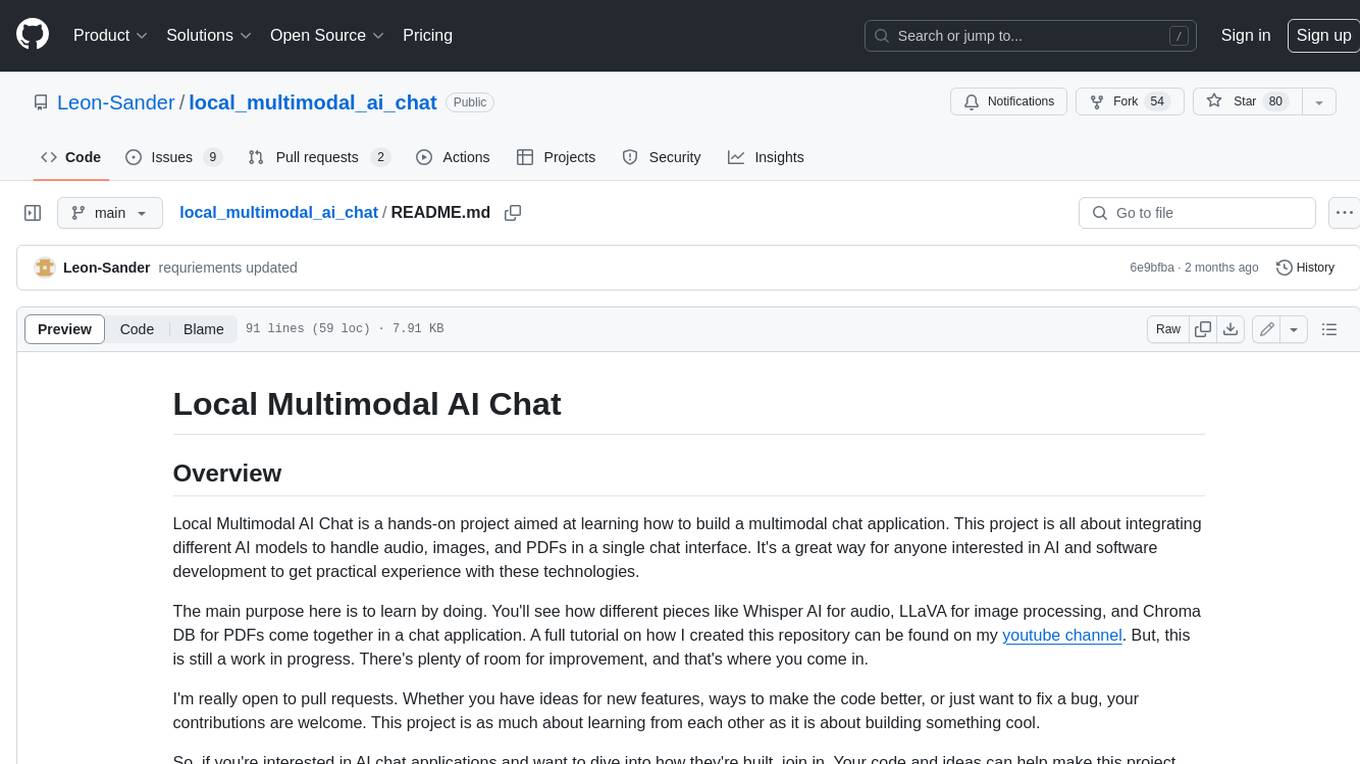
local_multimodal_ai_chat
Local Multimodal AI Chat is a hands-on project that teaches you how to build a multimodal chat application. It integrates different AI models to handle audio, images, and PDFs in a single chat interface. This project is perfect for anyone interested in AI and software development who wants to gain practical experience with these technologies.
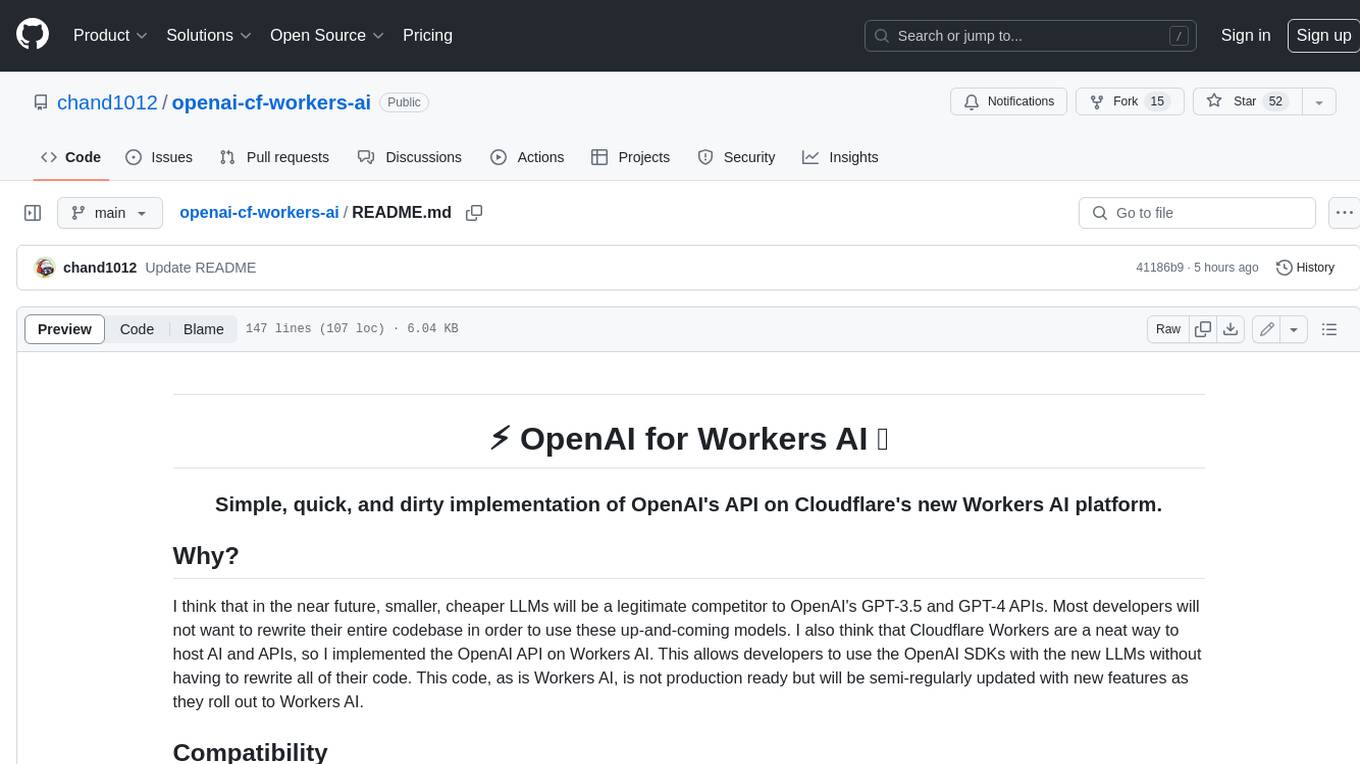
openai-cf-workers-ai
OpenAI for Workers AI is a simple, quick, and dirty implementation of OpenAI's API on Cloudflare's new Workers AI platform. It allows developers to use the OpenAI SDKs with the new LLMs without having to rewrite all of their code. The API currently supports completions, chat completions, audio transcription, embeddings, audio translation, and image generation. It is not production ready but will be semi-regularly updated with new features as they roll out to Workers AI.

ruby-openai
Use the OpenAI API with Ruby! 🤖🩵 Stream text with GPT-4, transcribe and translate audio with Whisper, or create images with DALL·E... Hire me | 🎮 Ruby AI Builders Discord | 🐦 Twitter | 🧠 Anthropic Gem | 🚂 Midjourney Gem ## Table of Contents * Ruby OpenAI * Table of Contents * Installation * Bundler * Gem install * Usage * Quickstart * With Config * Custom timeout or base URI * Extra Headers per Client * Logging * Errors * Faraday middleware * Azure * Ollama * Counting Tokens * Models * Examples * Chat * Streaming Chat * Vision * JSON Mode * Functions * Edits * Embeddings * Batches * Files * Finetunes * Assistants * Threads and Messages * Runs * Runs involving function tools * Image Generation * DALL·E 2 * DALL·E 3 * Image Edit * Image Variations * Moderations * Whisper * Translate * Transcribe * Speech * Errors * Development * Release * Contributing * License * Code of Conduct
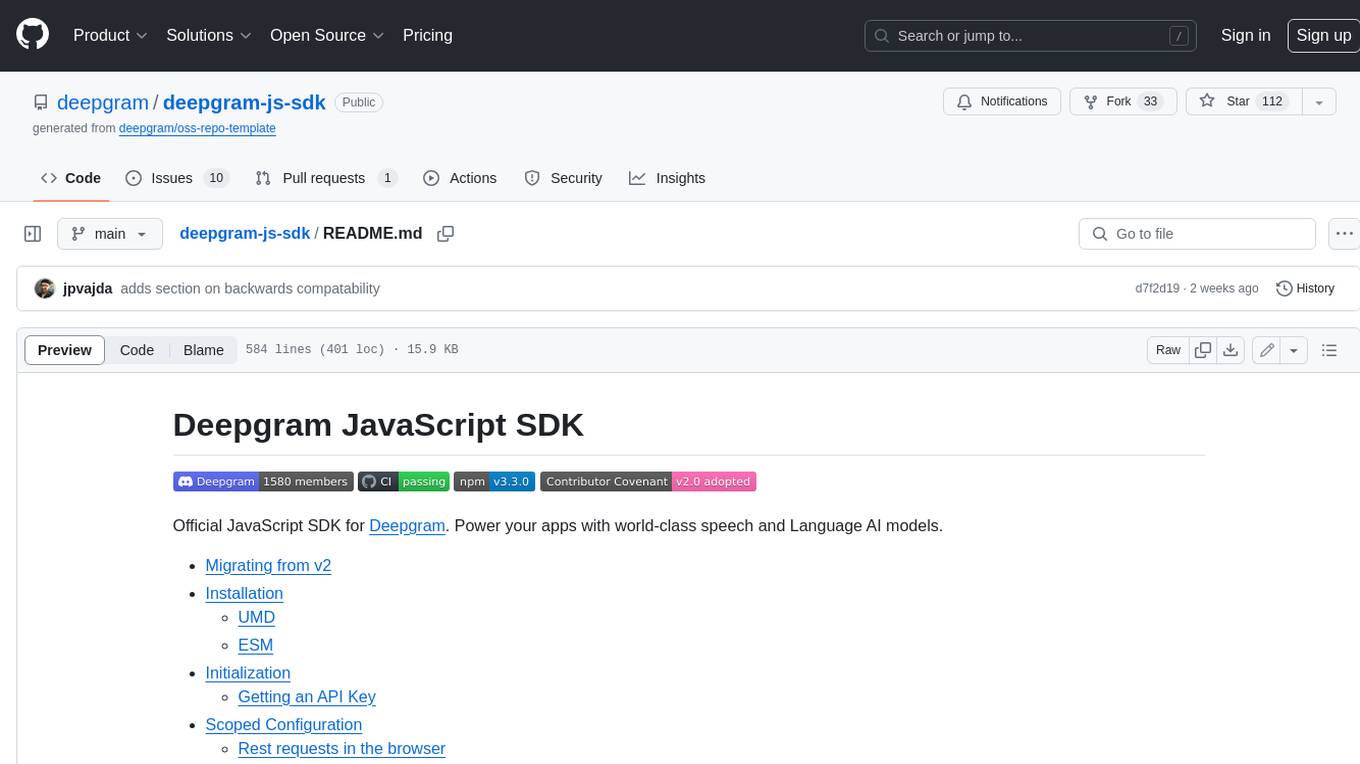
deepgram-js-sdk
Deepgram JavaScript SDK. Power your apps with world-class speech and Language AI models.
For similar jobs
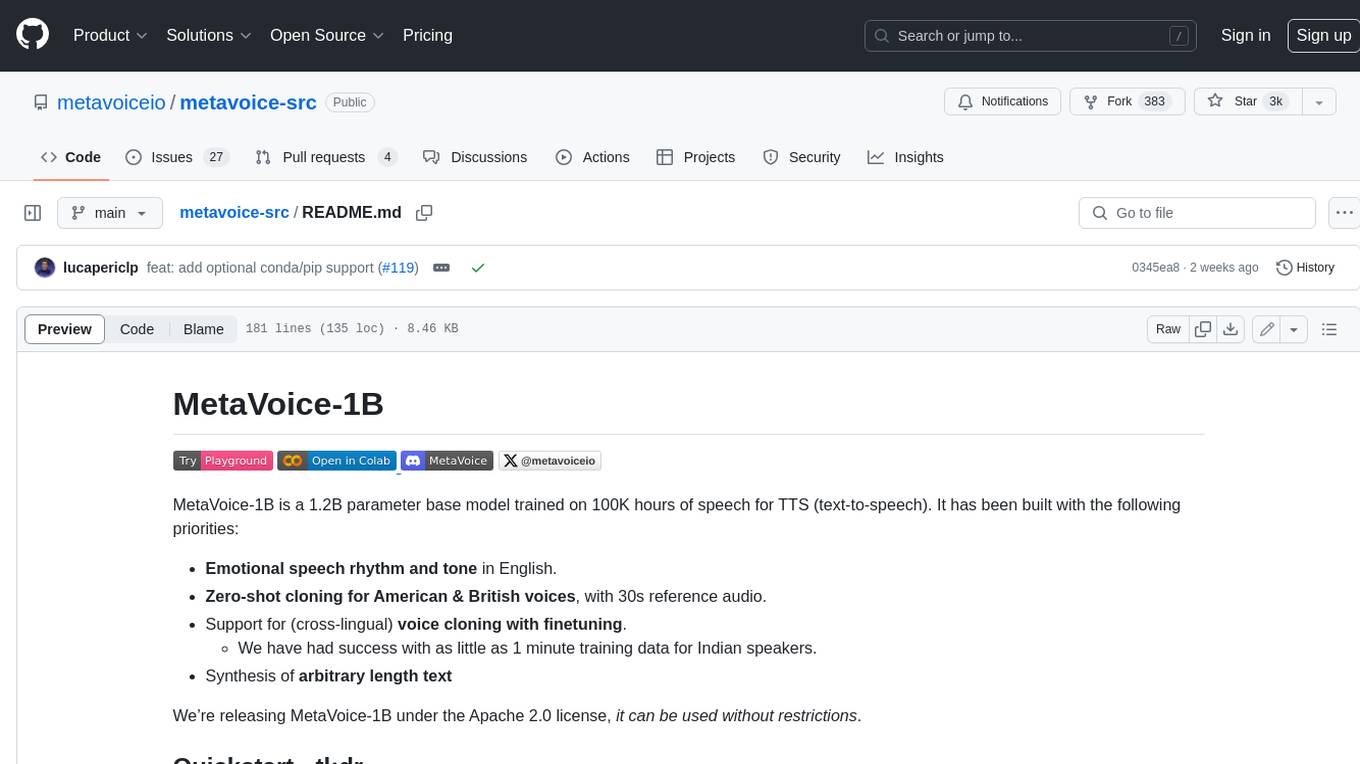
metavoice-src
MetaVoice-1B is a 1.2B parameter base model trained on 100K hours of speech for TTS (text-to-speech). It has been built with the following priorities: * Emotional speech rhythm and tone in English. * Zero-shot cloning for American & British voices, with 30s reference audio. * Support for (cross-lingual) voice cloning with finetuning. * We have had success with as little as 1 minute training data for Indian speakers. * Synthesis of arbitrary length text
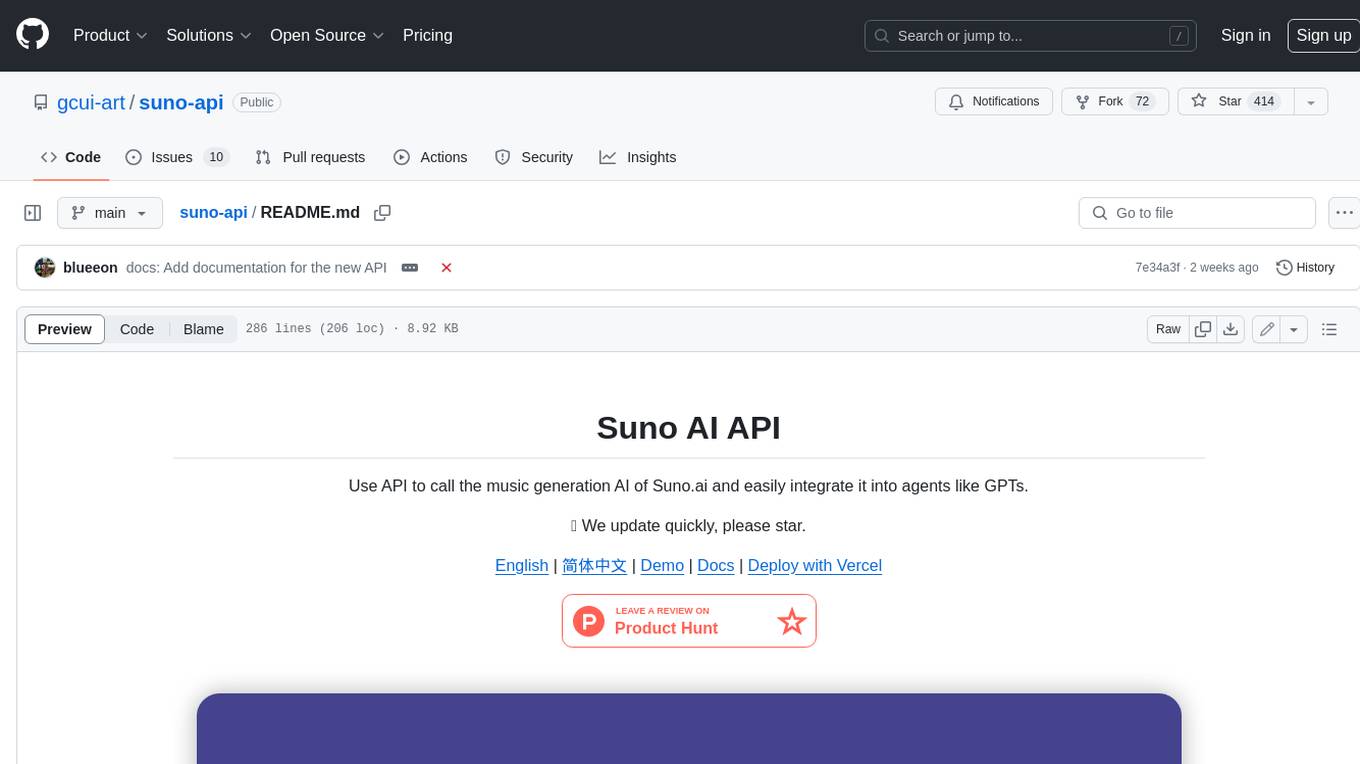
suno-api
Suno AI API is an open-source project that allows developers to integrate the music generation capabilities of Suno.ai into their own applications. The API provides a simple and convenient way to generate music, lyrics, and other audio content using Suno.ai's powerful AI models. With Suno AI API, developers can easily add music generation functionality to their apps, websites, and other projects.
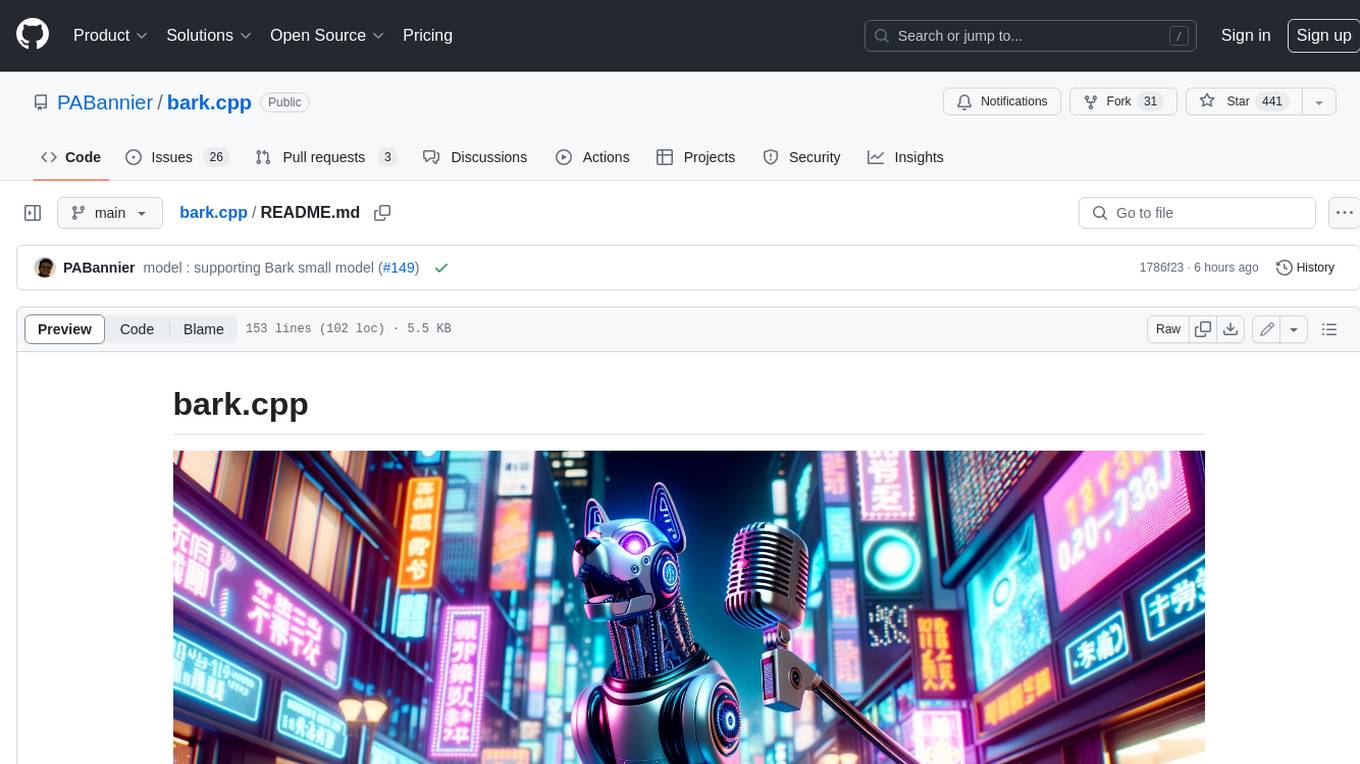
bark.cpp
Bark.cpp is a C/C++ implementation of the Bark model, a real-time, multilingual text-to-speech generation model. It supports AVX, AVX2, and AVX512 for x86 architectures, and is compatible with both CPU and GPU backends. Bark.cpp also supports mixed F16/F32 precision and 4-bit, 5-bit, and 8-bit integer quantization. It can be used to generate realistic-sounding audio from text prompts.
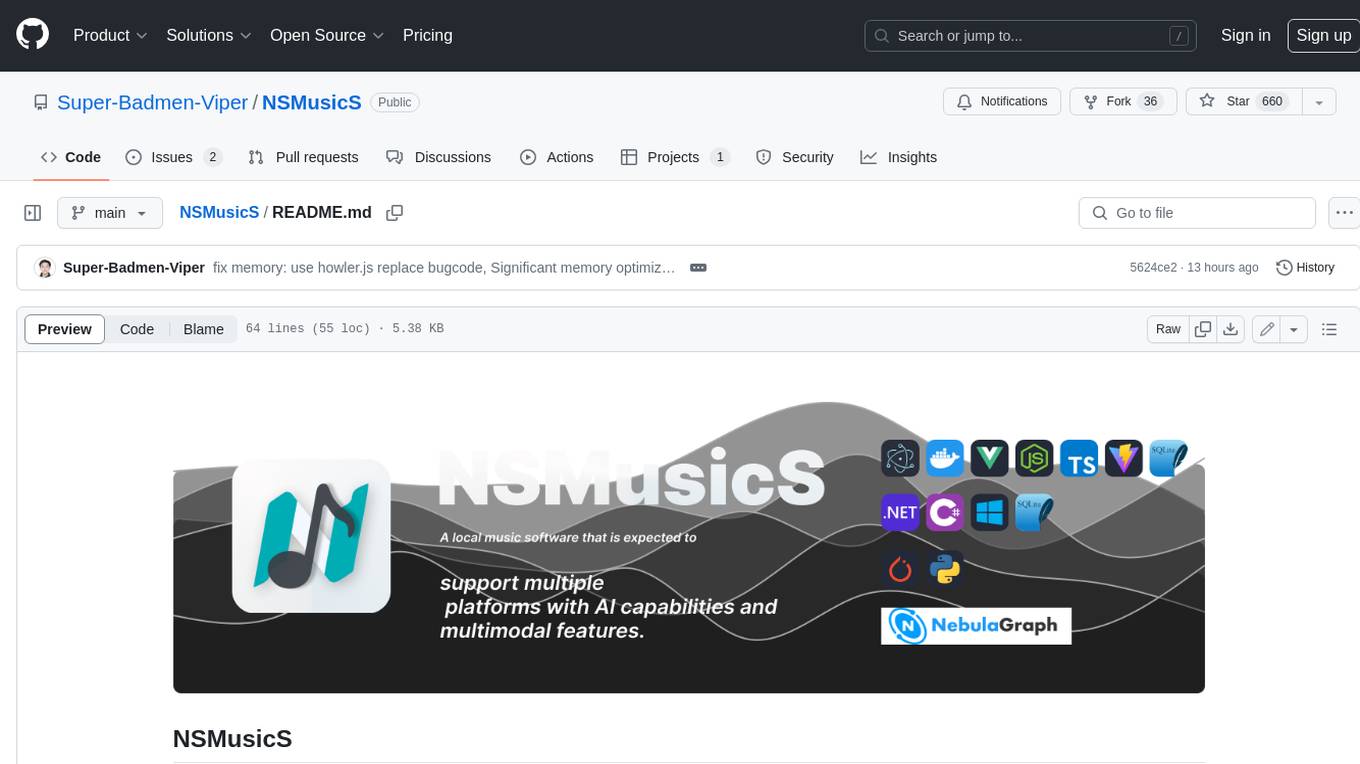
NSMusicS
NSMusicS is a local music software that is expected to support multiple platforms with AI capabilities and multimodal features. The goal of NSMusicS is to integrate various functions (such as artificial intelligence, streaming, music library management, cross platform, etc.), which can be understood as similar to Navidrome but with more features than Navidrome. It wants to become a plugin integrated application that can almost have all music functions.
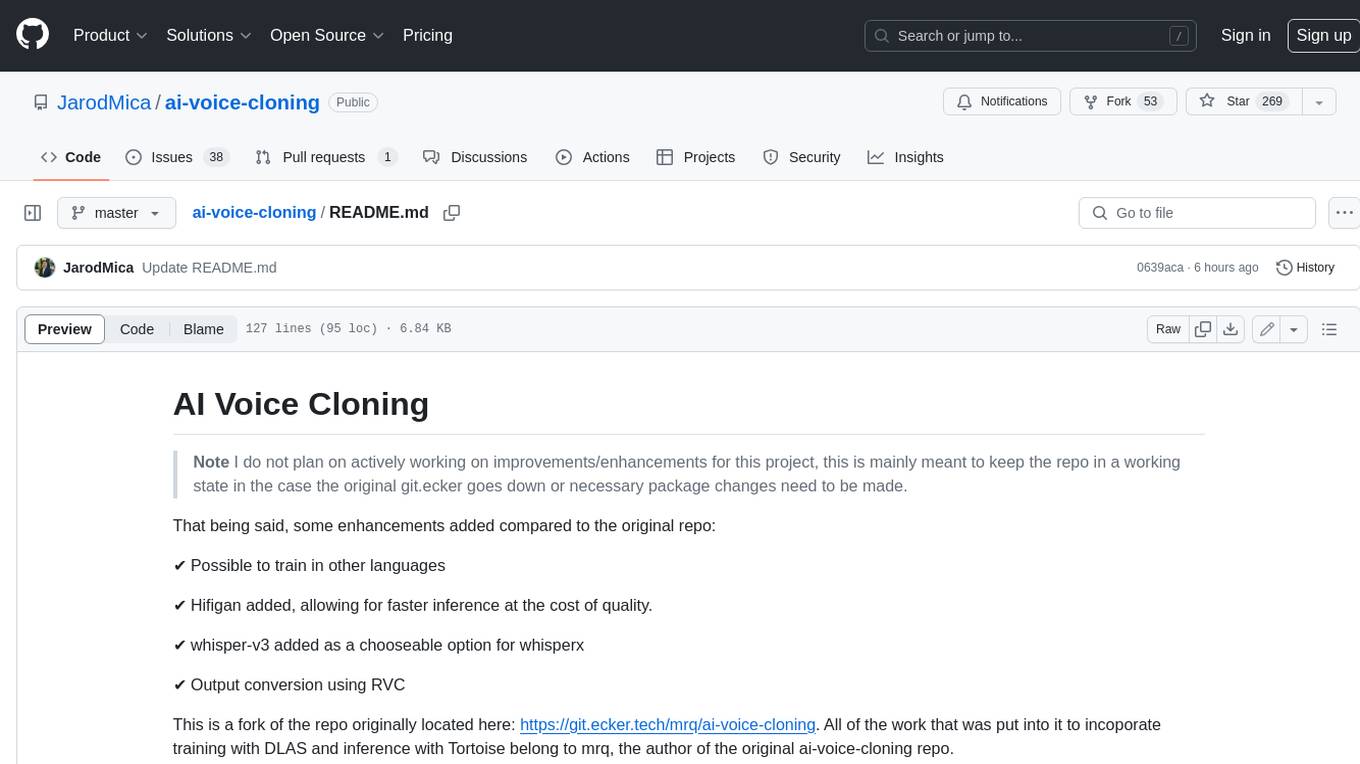
ai-voice-cloning
This repository provides a tool for AI voice cloning, allowing users to generate synthetic speech that closely resembles a target speaker's voice. The tool is designed to be user-friendly and accessible, with a graphical user interface that guides users through the process of training a voice model and generating synthetic speech. The tool also includes a variety of features that allow users to customize the generated speech, such as the pitch, volume, and speaking rate. Overall, this tool is a valuable resource for anyone interested in creating realistic and engaging synthetic speech.
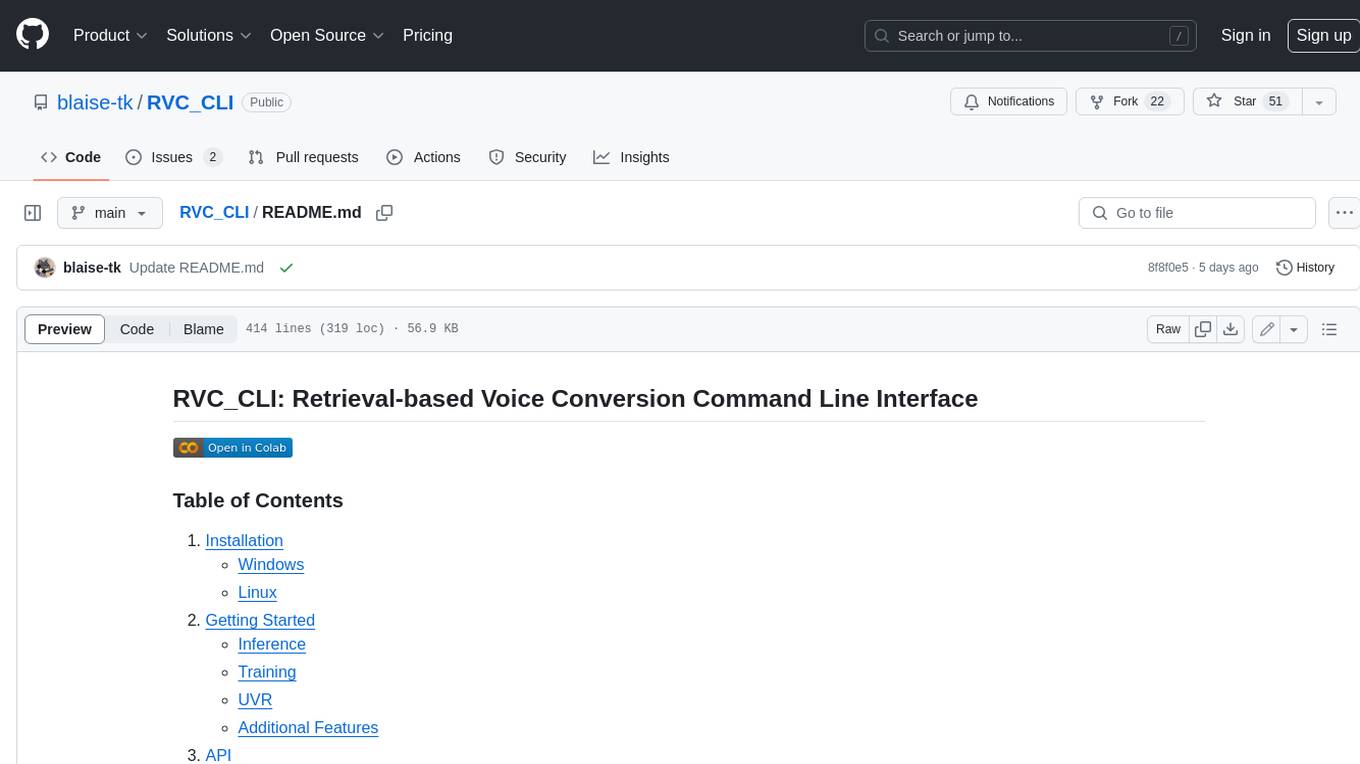
RVC_CLI
**RVC_CLI: Retrieval-based Voice Conversion Command Line Interface** This command-line interface (CLI) provides a comprehensive set of tools for voice conversion, enabling you to modify the pitch, timbre, and other characteristics of audio recordings. It leverages advanced machine learning models to achieve realistic and high-quality voice conversions. **Key Features:** * **Inference:** Convert the pitch and timbre of audio in real-time or process audio files in batch mode. * **TTS Inference:** Synthesize speech from text using a variety of voices and apply voice conversion techniques. * **Training:** Train custom voice conversion models to meet specific requirements. * **Model Management:** Extract, blend, and analyze models to fine-tune and optimize performance. * **Audio Analysis:** Inspect audio files to gain insights into their characteristics. * **API:** Integrate the CLI's functionality into your own applications or workflows. **Applications:** The RVC_CLI finds applications in various domains, including: * **Music Production:** Create unique vocal effects, harmonies, and backing vocals. * **Voiceovers:** Generate voiceovers with different accents, emotions, and styles. * **Audio Editing:** Enhance or modify audio recordings for podcasts, audiobooks, and other content. * **Research and Development:** Explore and advance the field of voice conversion technology. **For Jobs:** * Audio Engineer * Music Producer * Voiceover Artist * Audio Editor * Machine Learning Engineer **AI Keywords:** * Voice Conversion * Pitch Shifting * Timbre Modification * Machine Learning * Audio Processing **For Tasks:** * Convert Pitch * Change Timbre * Synthesize Speech * Train Model * Analyze Audio
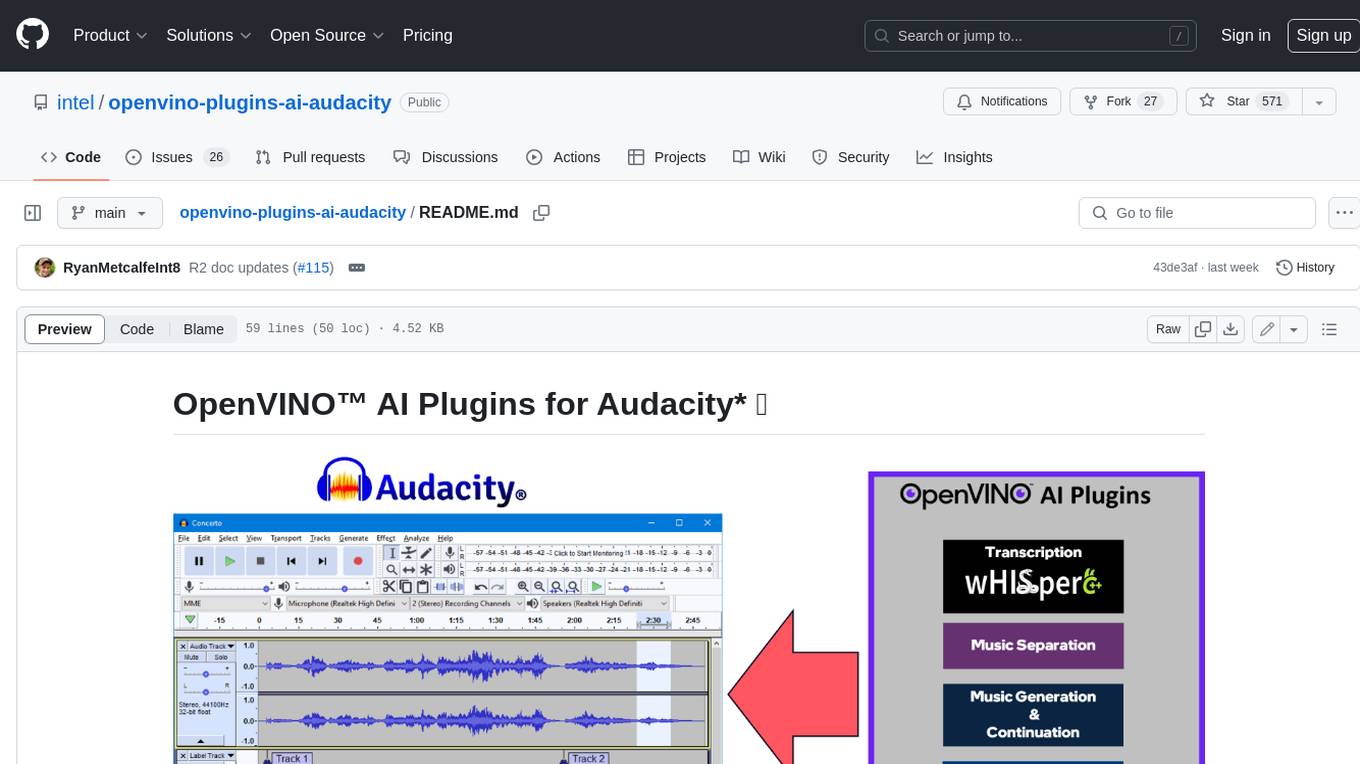
openvino-plugins-ai-audacity
OpenVINO™ AI Plugins for Audacity* are a set of AI-enabled effects, generators, and analyzers for Audacity®. These AI features run 100% locally on your PC -- no internet connection necessary! OpenVINO™ is used to run AI models on supported accelerators found on the user's system such as CPU, GPU, and NPU. * **Music Separation**: Separate a mono or stereo track into individual stems -- Drums, Bass, Vocals, & Other Instruments. * **Noise Suppression**: Removes background noise from an audio sample. * **Music Generation & Continuation**: Uses MusicGen LLM to generate snippets of music, or to generate a continuation of an existing snippet of music. * **Whisper Transcription**: Uses whisper.cpp to generate a label track containing the transcription or translation for a given selection of spoken audio or vocals.
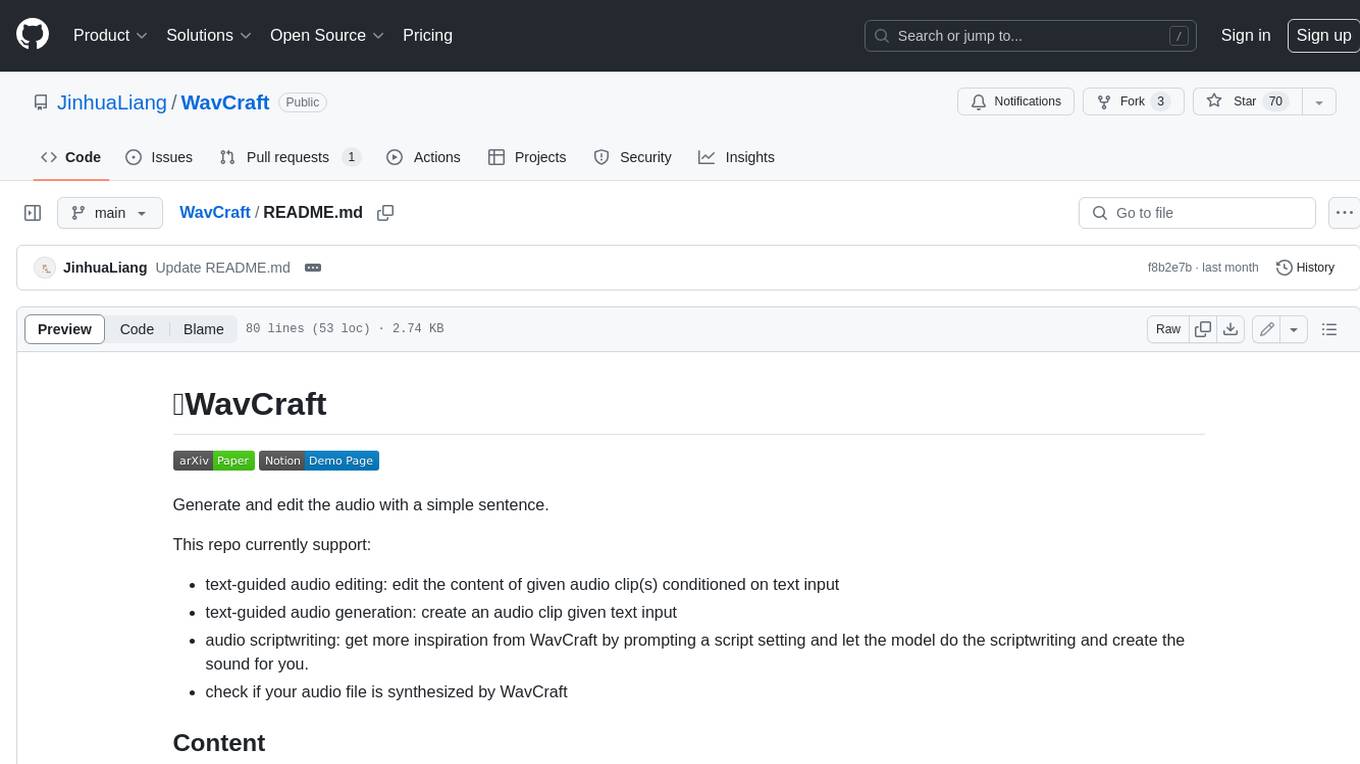
WavCraft
WavCraft is an LLM-driven agent for audio content creation and editing. It applies LLM to connect various audio expert models and DSP function together. With WavCraft, users can edit the content of given audio clip(s) conditioned on text input, create an audio clip given text input, get more inspiration from WavCraft by prompting a script setting and let the model do the scriptwriting and create the sound, and check if your audio file is synthesized by WavCraft.









